A Satanist madman meets a suitably unflattering end that's actually a stroke of genius which places his non-satanic non-mad heir in a great position. Long live the Habsburg dynasty.
Give 'Em the Ol' Basel Razzle-Dazzle - A Habsburg AAR
- Thread starter Green Rice
- Start date
-
We have updated our Community Code of Conduct. Please read through the new rules for the forum that are an integral part of Paradox Interactive’s User Agreement.
You are using an out of date browser. It may not display this or other websites correctly.
You should upgrade or use an alternative browser.
You should upgrade or use an alternative browser.
Well that was certainly a logical and straightforward way of solving the succession question. Almost noble in its own way.
Chuckle.Mass confusion erupts among the common-folk of Poland as in their confusion they believe that they are being attacked by their recently-deceased king, risen from the dead.
They are very narrow-minded, but at least they saw the light eventually.He immediately nominates his half-sister, Amalie, and although the vassal counts aren’t inclined to trust the judgement of a possessed and arbitrary lunatic, Amalie’s brilliance and virtuous nature win over their unanimous support.
Damned underlings! Can’t get good help these days.The details are unfortunately lost to historians, historians rumored to be from the same family as the oafish and ill-fated advisor to Werner.
A moderate and fair punishment.Upon discovery of this lapse in historiography and the previous one, the Transjuranian Historical Society gets a new head, as do the pikes outside Habsburg Castle.
It always comes at a cost.He questions what joining the cult of Lucifer got him in the end. All the fear and bloodshed he carried out, and what did he gain other than a corrupted mind and body.
His self-inflicted misery is over, with even his own demise horribly botched. One can only imagine his punishment will be eternal, devotee of Lucifer or not. But will his sister be any better?The dark days of Otto ‘the Devil’ are over. The legendary reign of Amalie ‘the Wise’ has only just begun.
Otto ended his reign as cheerful as he started it and with a lamentable lack of razzle or indeed dazzle. At least he got a lisp I suppose, even if it wasn't by traditional Habsburg means. 
Chapter 6: Habsburg Hungary Pans Out, but Premyslid Poland Perpetuates Problems
Chapter 6: Habsburg Hungary Pans Out, but Premyslid Poland Perpetuates Problems
A new day is dawning in Transjurania. Duke Otto has gone to be with...well, someone, at any rate, and his regent, half-sister, and heir Amalie is now Duchess in her own right. Possessed of a powerful physique, a mind to match, a patient and generous heart, a silver tongue, and a work ethic to boot, Duchess Amalie is the steady, responsible leadership her subjects and vassals have long awaited.
Amalie easily takes up the reins of power from her brother. No longer bound to his bedside, she declares her intent to go and join the troops still fighting in Hungary. Her councilors and advisors look quizzical at the suggestion, but despite their best efforts to convince Amalie against this unwomanly idea, she out-debates them all. The Holy War for Oltenia is ultimately a glorified and costly training exercise that results in no clear winner, but Amalie earns the respect of her officers with her sound leadership and understanding of tactics despite not being formally educated in warfare.
On Christmas Eve 1097, Amalie joins the Hermetic Society. She immediately begins work on a theorem paper on fermentation. Despite taking less than a year to conduct, compile, and summarize her research—all done in between leading troops on campaign, no less—the paper is published on 23 August 1098 to universal acclaim, a testament to her ability to multitask as well as her natural genius.
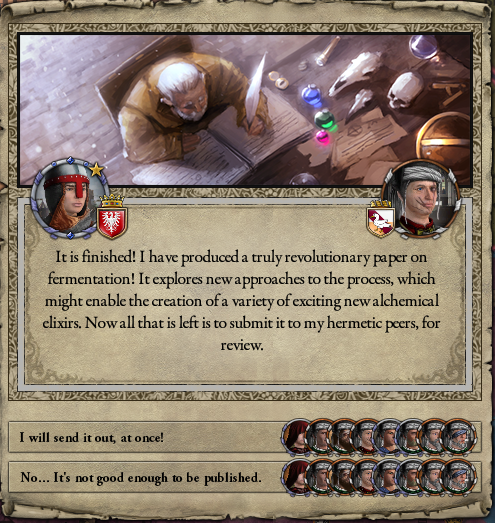
Shortly thereafter, Amalie participates in the summoning of a Divine Being, although the cryptic advice it gives her actually hinders her intrigue skill for a time. Amalie also takes an interest in astronomy, and begins making studies of planetary motion on her free evenings. By no means does her new hobby get in the way of her combat training, however: On 6 March, 1098 at the Battle of Targu Jiu, she maims an enemy bishop in her first significant battlefield duel, leaving him with only half a hand.
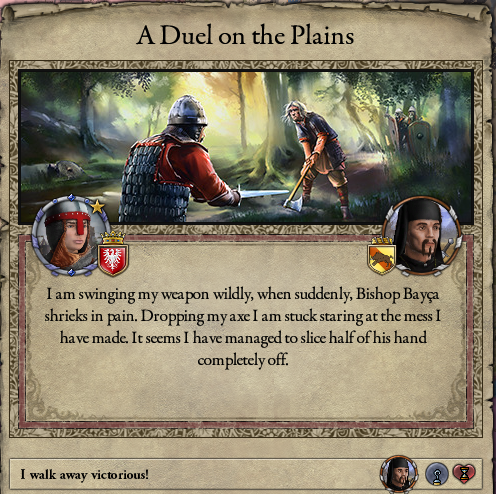
But that very same spring also brings a tragedy: Etienette von Habsburg is smothered by her governess on 22 April just four days after her tenth birthday. Whoever hired the woman as their assassin must have disfavored the matrilineal match with King Humphrey of Sicily, but they paid handsomely, for she took her employer’s name to her grave.
The First Crusade officially kicks off in 1099. Amalie is busy neutering threats to her mother’s realm, yet the stubborn, self-important, and short-tempered zealot known as Pope Alexander III decides to get on her case for not abandoning her subjects to go kick Fatimid butt 3,163 kilometers (1965 miles) away.
Amalie decimates the main forces of her enemies by year's end, notably at the Second Battle of Targu Jiu, where she cements her reputation as a master of combat on flat terrain in the process, and makes a beeline for Jerusalem.
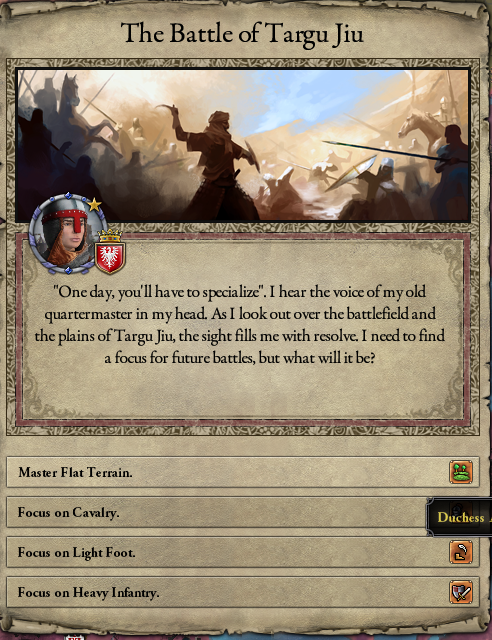
Meanwhile, Poland is recovering from yet more “Wars of the Eagles”, as they are coming to be called in homage to the arms of the various Premyslid and Piast factions wrestling over the kingdom. At this point, anyone asking a town of Poles who their monarch is will get about half a dozen different answers thrown back at them. So sit back and relax as this author tries to unravel the Great Polish Dumpster Fire of the Later 11th Century.
When we began our story, Poland was ruled by King Boleslaw II Piast, known as ‘the Bold.’ He died in 1078 in personal combat. Having no male heir, his eldest daughter Maria Piast took the throne, but she was deposed just years later in 1081 by Vladislav Premyslid, her cousin born from the union of Boleslaw’s sister and Vratislav, King of Bohemia. Vladislav died of an infected wound in 1087 and was survived by his heir, Nikolaus and a posthumous daughter, Justina. The King of Bohemia then won a second war in 1091 to replace Nikolaus with Vladislav’s older brother Boleslav, husband of Ida von Habsburg and father of Helferich von Habsburg, the new heir apparent of Poland.
Unfortunately King Vratislav, now a raging alcoholic apparently incapable of keeping a secret, left enough breadcrumbs for Kaiser Heinrich V’s Court Chaplain to follow and unmask him as a Satanist. Vratislav burned at the stake on 30 July 1093, and everything came unraveled all over again. His brother Konrád inherited Bohemia under the laws of seniority succession. Konrád was apparently miffed by the fact that his nephew, King Boleslav of Poland, had no heir of their dynasty. Fortunately, in April 1095, Anna Poraj, Duchess of Greater Poland, declares a revolt against Boleslav to return Maria Piast, now Duchess of Lesser Poland and Mazovia, to the throne. Although Justina has only a weak claim to Poland, the fact that the kingdom is now contested provides a sufficient reason for someone to press it for her. So Konrád spends a year preparing and then declares his own war on her behalf in September 1096. He beats Maria Piast to the finish line in 1100, and Justina Premyslid is crowned Queen Regnant of Poland.
In other news from the year 1100, Amalie publishes her second paper, this one on heliocentricity. Despite objections to its publication by the Church, many readers are drawn in by how well-explained Amalie’s findings are, even to the layperson reader. She becomes known as ‘Amalie the Wise.’
Having managed to narrowly avoid the complete wrath of the Church, Amalie’s curiosity instead catches up to her in a different way. While raiding another Hermetic’s laboratory, she is captured and imprisoned by the owner, Count Theodoros Monomachos of Kaliopolis. When the news reaches Basel, the people are not entirely surprised by Amalie’s intractable search for ever more knowledge, but are nonetheless outraged that the Count of Kaliopolis would dare imprison their noble duchess.
The Pope declares the First Crusade a success on 7 May 1101, and grants the Kingdom of Jerusalem to Gerardo Fieschi. Amalie is disappointed but not surprised that her contribution proved too small and too late to win any new titles for the von Habsburgs in the Holy Land. It matters not, she tells herself. The Crusade was for the glory of God and his Son Jesus Christ, not my own family. Our ambitions lie closer to home.
While Amalie whittles away her time in Theodoros' dungeon, her liege Kaiser Heinrich V ‘the Frail’ is having his own struggle: he has a severe case of gout. In August 1101 the disease takes his life and the Prince-Electors select the Duke of Swabia, Wenzel von Pommern, as his successor.
On 29 December of 1101, Amalie finally receives a visitor in her dungeon cell. It is none other than Count Theodoros himself, holding a letter in his hand.
“Well, my dear,” he greets her with a sly sarcastic sneer, “I believe both condolences and congratulations are in order, the former for the passing of your mother, and the latter for the passing of her throne to you.” He callously tosses the letter at Amalie’s feet. Amalie, dumbfounded, breaks the seal bearing the sigil of the Árpáds, and reads the letter. It is all too true. According to her mother’s chancellor, Prince Géza, Queen Mária of Hungary passed peacefully in her sleep on 13 November at the age of 51. Pope Alexander III took the decision to beatify her when the news reached Rome.
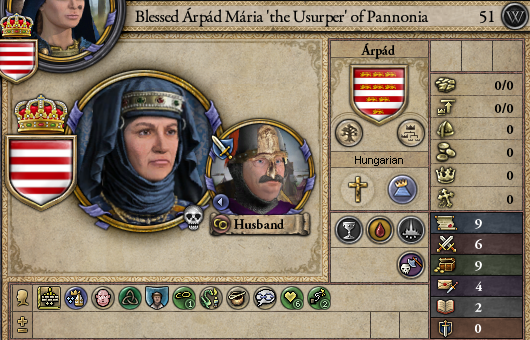
“I scarcely believe what I am reading,” Amalie says in the faintest of whispers, yet in the stillness of the dungeon air even her muted voice cuts through the silence like a knife.
“I knew if I only bided my time I could get a...queen’s ransom for you,” Count Theodoros remarks wryly. “And now, Queen Amalie of Hungary, I come bearing my offer. Two hundred and fifty gold pieces for your safe return.”
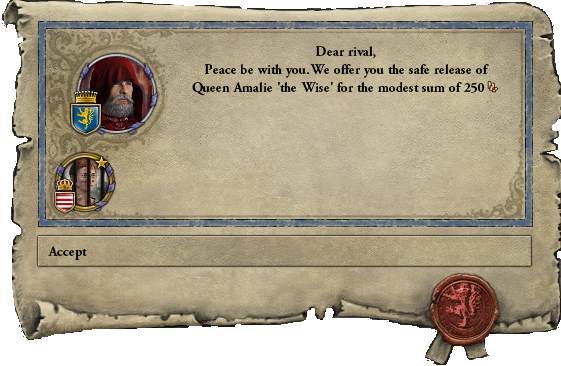
“I am tempted to quote Caesar when he was ransomed by the pirates, but I will not give you the satisfaction to extort me further. Two hundred and fifty and not a penny more, or you will bear witness to the righteous fury of my subjects and our allies. Furthermore, I must correct you in that there is no more Hungary, for I am no Magyar. My realm will take the name it was given by the Romans: Pannonia."
The ransom paid, Amalie rejoins her armies straightaway. The Crusade is over but she has inherited two wars in addition to the crown. The first her mother began to press a claim to the High Chiefdom of Bolghar for Prince Géza, who already holds the Duchy of Neutra. The other was declared by Duke Balc Jianu of Mutentia, a Wallachian vassal of the Pechenegs, to press his nephew Iorghu’s claim on the county of Temes.
As if two wars were not already enough, on the seventh of March 1102, Amalie receives a call to arms from Queen Justina of Poland, their alliance being renewed through the marriage of Amalie’s niece Sophie von Habsburg and Justina’s uncle Prince Ojír, who is now serving Amalie as her steward. Justina is still fighting Anna Poraj, but with her Hungarian helpers the rebels are all but eliminated and Duchess Anna will ultimately be imprisoned in 1104. Before she surrenders to Justina, though, Anna effectively flips the bird at her captor by signing over Poznań to her other foe, High Chief Waclaw 'the Fox' of Pomerania, on March 1st. Anna is locked up for the rest of her life, which turns out to only be another couple months, for she dies in her cell that June. Coincidentally, Maria Piast follows suit in October after contracting pneumonia.
In midsummer 1102, Amalie’s network of spies reports that on the eleventh of June, Captain Voitto Kukkonen died of cancer, the very death meant for his most famous victim, King Werner of Hungary. Amalie smiles and sheds a tear as she notes the irony.
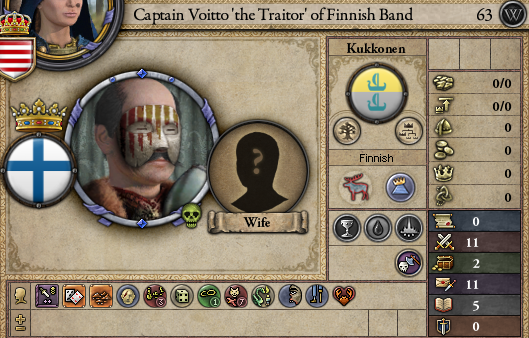
While the loss of Werner might be mourned, the loss of his son Otto is clearly not, as witnessed by the actions of his widow. Gisèle d’Ivrea, still unmarried, gives birth on 25 September 1102 to Julienne de Gran, the baseborn daughter of the Duke of Transylvania, the aptly-titled Borisz ’the Lecher.’
Amalie, however, is too busy between wars and her work with the Hermetic Society to chastise her sister-in-law. About a month after the birth of Julienne, on 29 October, Amalie signs a white peace with chief Ernakh, having no real interest in the Bolghar lands nor expanding the influence of Prince Géza, who already controls a powerful duchy and could potentially claim her throne. The next year is spent mostly crushing the Mutenians, with a slight detour on 3 February 1103 to summon a Divine Being for a second time. Amalie has much more success and receives an epiphany.
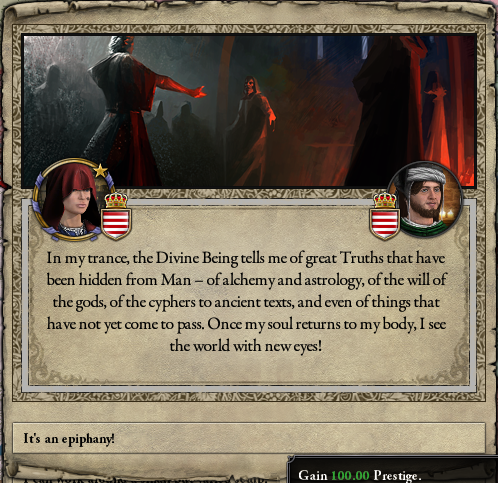
11 days later, Prince Simon receives a wondrous present for his eighth birthday: a baby sister named Hildegard. And a big present she is, too, freakishly big, in fact, but the Habsburgs accept her into their family regardless, in fact almost more so for her unusual appearance. (Shocking!)
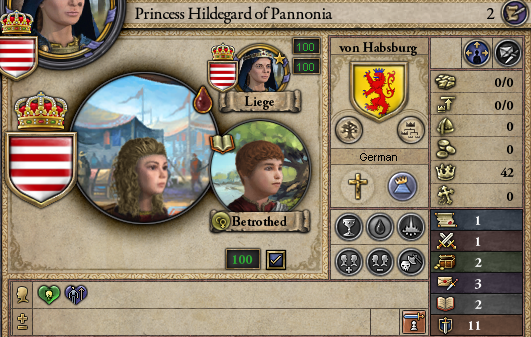
Over the summer of 1103, Amalie also oversees via correspondence the construction of a state-of-the-art remote laboratory, which is completed on 2 August. The Mutenians finally surrender weeks later on the twenty-fifth.
Her realm at long last at peace, Queen Amalie now faces an important decision. She summons a meeting of her council in Habsburg Castle on the first of April 1104.
“My trusted advisors,” she begins, “through our joint efforts, and at the expense of many brave men, we have procured the security of our lands for the present time. However we must anticipate new threats, and seek to restore what was taken from us. My mother was a fair and wise queen, but even she could not hold off all of the many foes she faced in her time. In the East, the province of Szekelyföld was lost to the Pechenegs in 1075. In the West, Eisenburg was stolen in 1084 by the coward Adelbero Otakeren, the Duke of Steiermark. The restoration of these lands and the liberation of my mother’s people who live there must be a priority.
“Concurrently, we must protect my father’s lands here in Transjurania, which are now in potential jeopardy. As Queen of Pannonia I answer to no liege lord, and thus the Holy Roman Emperor may decide that this land is forfeit to him. I am loath to go to war with all of Germany, especially when our people are already weary from over three decades of near-constant conflict, but I understand if you are reluctant to have me pledge fealty to the Kaiser instead. I seek the wisdom of the council on these matters.”
The towering, hulking frame of Marshal Árpád Gyula, the Duke of Gran, rises first to speak. Perhaps his side of the family is where Hildegard gets her giant’s blood from, Amalie wonders.
“The Kings of Hungary have never bent the knee to another, but I concur with Her Majesty’s assessment of our military readiness. The people are exhausted, and I expect if we continue to siphon off men from the farms to fight in the army we could face a food crisis sooner than later. I also fear that the strength of the Empire is too much for us to handle ourselves, or even with our allies. We can field, as of the last tally, about 5,000 men. Adding in Poland gives us another 2,000. The last time I spoke with Prince Borisz,” he continued, gesturing at the spymaster, who was alternating looking at his reams of notes and staring lustily at Amalie, “he estimated the Kaiser’s total military capacity at 17,000. Unless the crown can afford 10,000 mercenaries, which I doubt, any war with the empire would be a waste of good men.” He sat back down.
“Prince Ojír, what do you have to say in concurrence or disagreement to Prince Gyula’s assessments?” Queen Amalie asks, addressing her steward. The young man takes his cue to stand and speak.
“Prince Gyula speaks accurately of our situation on both counts. Our winter stores were only just adequate. We need plenty of men back on the farms this year if we hope to live to see the next one. As for the suggestion of mercenaries, he is also right, the crown currently cannot take in enough revenue through taxes to support such numbers, nor do we have any reserves of coin anywhere near sufficient to last us through a war of that scale. I would also advise Her Majesty to submit to the emperor on the grounds that once a fellow vassal, she will be in a better position to renew the alliance with my home country and assist her if she requests aid.” He bowed his head respectfully and retook his seat, and Prince Borisz rose to take his place.
“I would like to confirm Prince Gyula’s assessments, as well,” he says passionately. “And concur with him and Prince Ojír that the safest option for the realm would be under the protection of the Holy Roman Empire. It could also open up possibilities to add to our allies, which we will need if we hope to reclaim Szekelyföld, as I regret to inform the council that the Pechenegs are now tributaries to the Greeks and under their protection.”
“I also agree,” cuts in Bishop Adolf of Aubonne, the court chaplain. “Her Majesty will also find more opportunities within the empire than without to reclaim the lost lands.”
“Sit down and wait your turn to speak, little man,” growls Duke Csanád Pongrácz of Temesch, ever quick to anger. “I personally am not inclined to see my home subsumed into the Kaiser’s dominions after centuries of independence and without a fight, but I see I am in the minority on this council, and I am not keen on dying in a hopeless war either. I have faith in my queen that whatever may befall us she will see that no harm will come our way.”
“Here, here!” come the boisterous voice of Prince Géza, the chancellor, his great belly shaking with every word. “I will second that sentiment and that of my colleagues on the council. I am called the Half-Hand,” he notes, displaying the glove on his left hand, the last few fingers of which are empty and hanging limp, “and the Lord help me if I should lose the other fighting the Kaiser, or worse yet, my head!”
“Then it seems the council is unanimous” Queen Amalie observes. “Well then, Chancellor, make good use of that one good hand of yours. You have a letter to write on my behalf.”
And so the following day, 2 April 1104 a courier is sent to Kaiser Wenzel von Pommern informing him of Queen Amalie’s desire to swear fealty.
On 15 September, in the midst of preparing for her coronation by the new Pope, Gregorious VII, Amalie suffers the loss of a partner for the second time. King Martín dies of natural causes at the age of 46. To add to her heartbreak, Amalie has only just recently discovered she is pregnant with their third child. At King Konrád of Bohemia’s suggestion, Amalie betroths herself to his grandson, 13-year-old Prince Ota to renew the old non-aggression pact between their realms, a decision she will later regret.
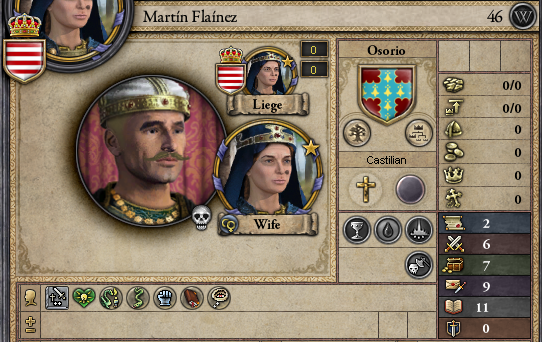
Without Martín being crowned King beside her, Amalie’s coronation as Queen Regnant of Pannonia on 29 November, 1104 is bittersweet. Her mood is somewhat lightened by thoughts of what her father Werner would have thought of seeing the Pope lay the Crown of Hungary on her head in such a magnificent ceremony. It was everything he had dreamed of.
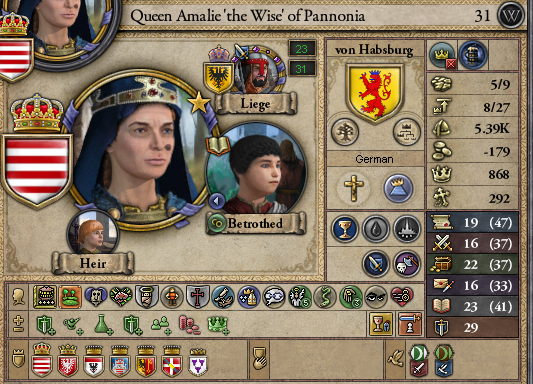
Now confirmed as queen before God, Amalie’s attention turns to repairing her slightly fractured kingdom. Szekelyföld is out of reach, so long as the Byzantines defend the Pechenegs whom they have also converted to Orthodoxy. That leaves Eisenburg as the first logical target.
Amalie takes her advisors’ words to heart and seeks out a new possible ally: Duchess Romilda von Babenberg of Austria. Romilda is the widow of Adelbero’s late son Burchard, who’d died of dysentery eight years previous. After hosting Romilda in a private feast, the two reigning women become close friends, so close that Romilda is willing to matrilineally betroth her son and heir Alois to Amalie’s infant daughter Hildegard. Already resigned to Austria passing out of her family, Romilda decides to throw a wrench into the schemes of Alois’ grandfather, who controls the rightfully Austrian counties of Steyr and Traungau, and who had already demonstrated a disregard for his own kin by burning his own brother, Count Otakar of Eppenstein, at the stake for apostasy.
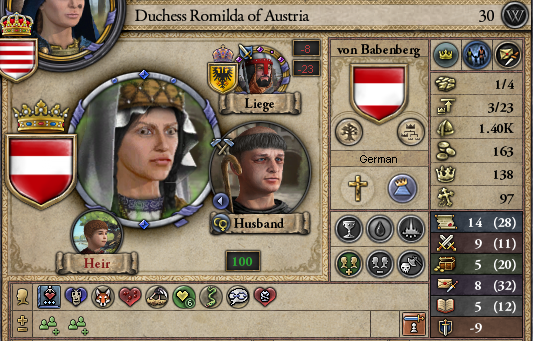
Surprisingly, Amalie doesn’t take the opportunity the betrothal provides to form an official alliance, though scholars debate whether this was intentional to avoid jeopardizing a new potential dynastic acquisition or due to an...oversight. Those on the latter side of the debate will also point out that Amalie similarly never formally allied with Konrád of Bohemia, despite Ojír’s request, although their opponents will usually make the counter-argument that Amalie could have already been planning at this early stage to seize Bohemia for her own family, so it was unlikely that she would overlook an ally on her enemy’s doorstep. All this author will say is:

Regardless of her intentions vis-à-vis Austria, Amalie wants to strike a different tone than her brother, so bolstered by her faith in her own rhetorical prowess, she sends a diplomatic missive to Duke Adelbero, requesting that he peacefully return Eisenburg and its attendant lands to the Kingdom of Pannonia. While she waits she gives birth on 14 April to her second son, whom she names Martin, in honor of the father who will never know him.
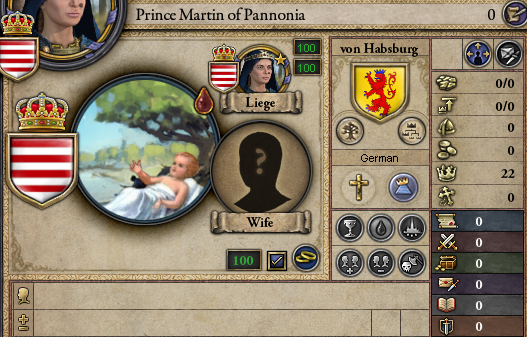
To call the Duke’s reply on 26 June 1105 unsatisfactory would be an understatement:
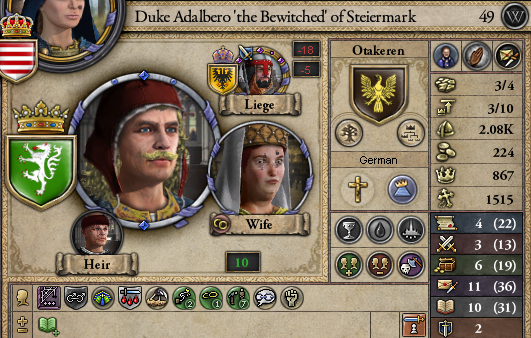
Amalie stares with pursed lips at that last title, clearly intentionally placed to provoke her. I’ll concede you the victory on that score, Adelbero. But you’ll find others difficult to come by.
“If Otakeren desires to fight to defend his stolen lands,” she intones calmly, despite the visible crumpling of the paper in her powerful hands, “then Pannonia will be honored to oblige his request.” She tosses the letter into the roaring fireplace behind her seat on the dais of the great hall. Although she turns away from the flames to face her council, they see the reflection of its fire in her eyes nonetheless. Their stomachs turn to stone and all words of objection are stopped in their throats as she gives her orders:
“Summon my officers, raise our levies and call the banners. We are going to war.”
Next Time…
Amalie and Adelbero’s power struggle shakes up the Holy Roman Empire.
A new day is dawning in Transjurania. Duke Otto has gone to be with...well, someone, at any rate, and his regent, half-sister, and heir Amalie is now Duchess in her own right. Possessed of a powerful physique, a mind to match, a patient and generous heart, a silver tongue, and a work ethic to boot, Duchess Amalie is the steady, responsible leadership her subjects and vassals have long awaited.
Amalie easily takes up the reins of power from her brother. No longer bound to his bedside, she declares her intent to go and join the troops still fighting in Hungary. Her councilors and advisors look quizzical at the suggestion, but despite their best efforts to convince Amalie against this unwomanly idea, she out-debates them all. The Holy War for Oltenia is ultimately a glorified and costly training exercise that results in no clear winner, but Amalie earns the respect of her officers with her sound leadership and understanding of tactics despite not being formally educated in warfare.
On Christmas Eve 1097, Amalie joins the Hermetic Society. She immediately begins work on a theorem paper on fermentation. Despite taking less than a year to conduct, compile, and summarize her research—all done in between leading troops on campaign, no less—the paper is published on 23 August 1098 to universal acclaim, a testament to her ability to multitask as well as her natural genius.

Shortly thereafter, Amalie participates in the summoning of a Divine Being, although the cryptic advice it gives her actually hinders her intrigue skill for a time. Amalie also takes an interest in astronomy, and begins making studies of planetary motion on her free evenings. By no means does her new hobby get in the way of her combat training, however: On 6 March, 1098 at the Battle of Targu Jiu, she maims an enemy bishop in her first significant battlefield duel, leaving him with only half a hand.

But that very same spring also brings a tragedy: Etienette von Habsburg is smothered by her governess on 22 April just four days after her tenth birthday. Whoever hired the woman as their assassin must have disfavored the matrilineal match with King Humphrey of Sicily, but they paid handsomely, for she took her employer’s name to her grave.
The First Crusade officially kicks off in 1099. Amalie is busy neutering threats to her mother’s realm, yet the stubborn, self-important, and short-tempered zealot known as Pope Alexander III decides to get on her case for not abandoning her subjects to go kick Fatimid butt 3,163 kilometers (1965 miles) away.
Yes, dear reader, I Google Mapped the exact distance from Budapest to Jerusalem just for you.
Amalie decimates the main forces of her enemies by year's end, notably at the Second Battle of Targu Jiu, where she cements her reputation as a master of combat on flat terrain in the process, and makes a beeline for Jerusalem.

Meanwhile, Poland is recovering from yet more “Wars of the Eagles”, as they are coming to be called in homage to the arms of the various Premyslid and Piast factions wrestling over the kingdom. At this point, anyone asking a town of Poles who their monarch is will get about half a dozen different answers thrown back at them. So sit back and relax as this author tries to unravel the Great Polish Dumpster Fire of the Later 11th Century.
The Wars of the Eagles
1078 - 1100
1078 - 1100
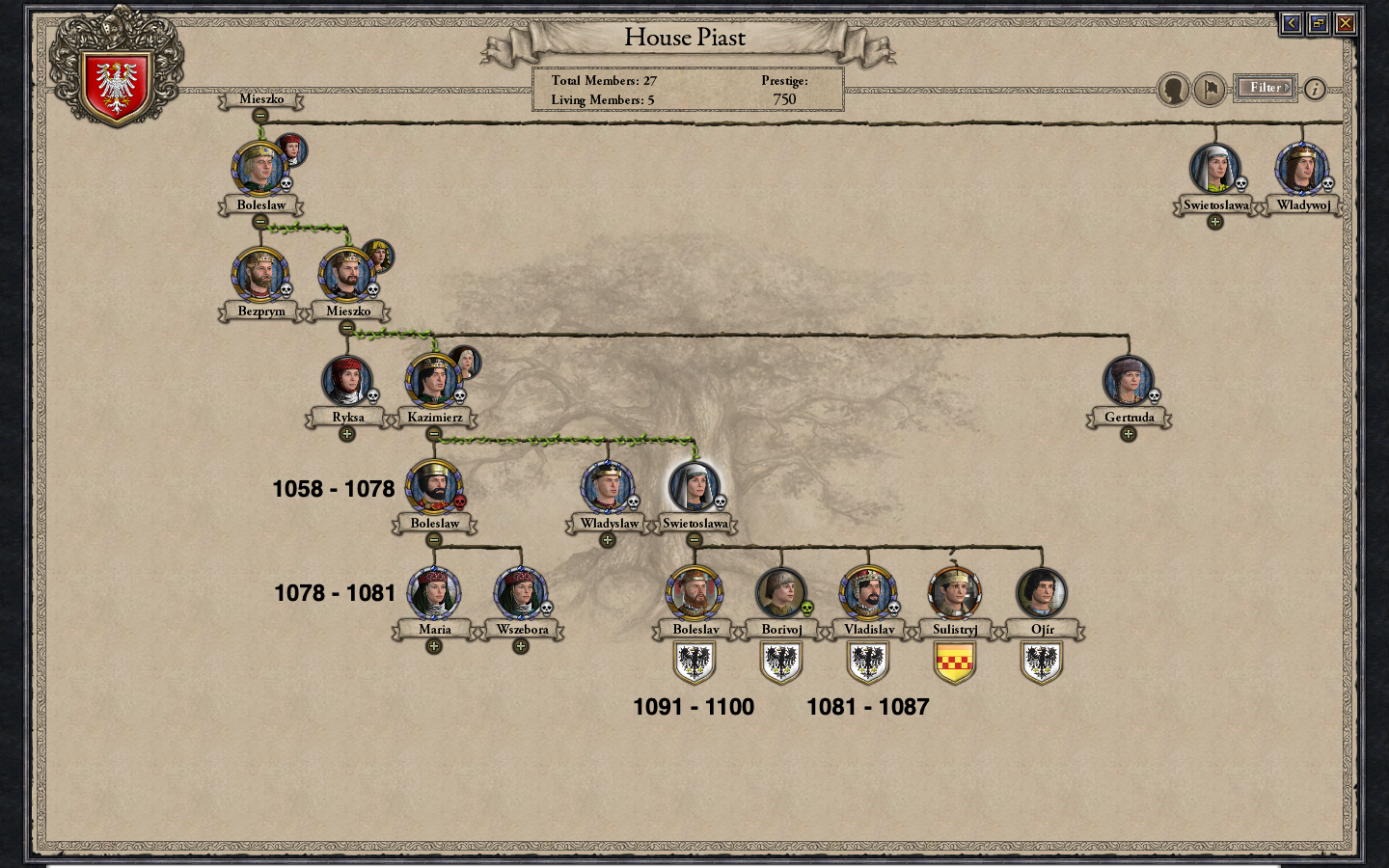
| 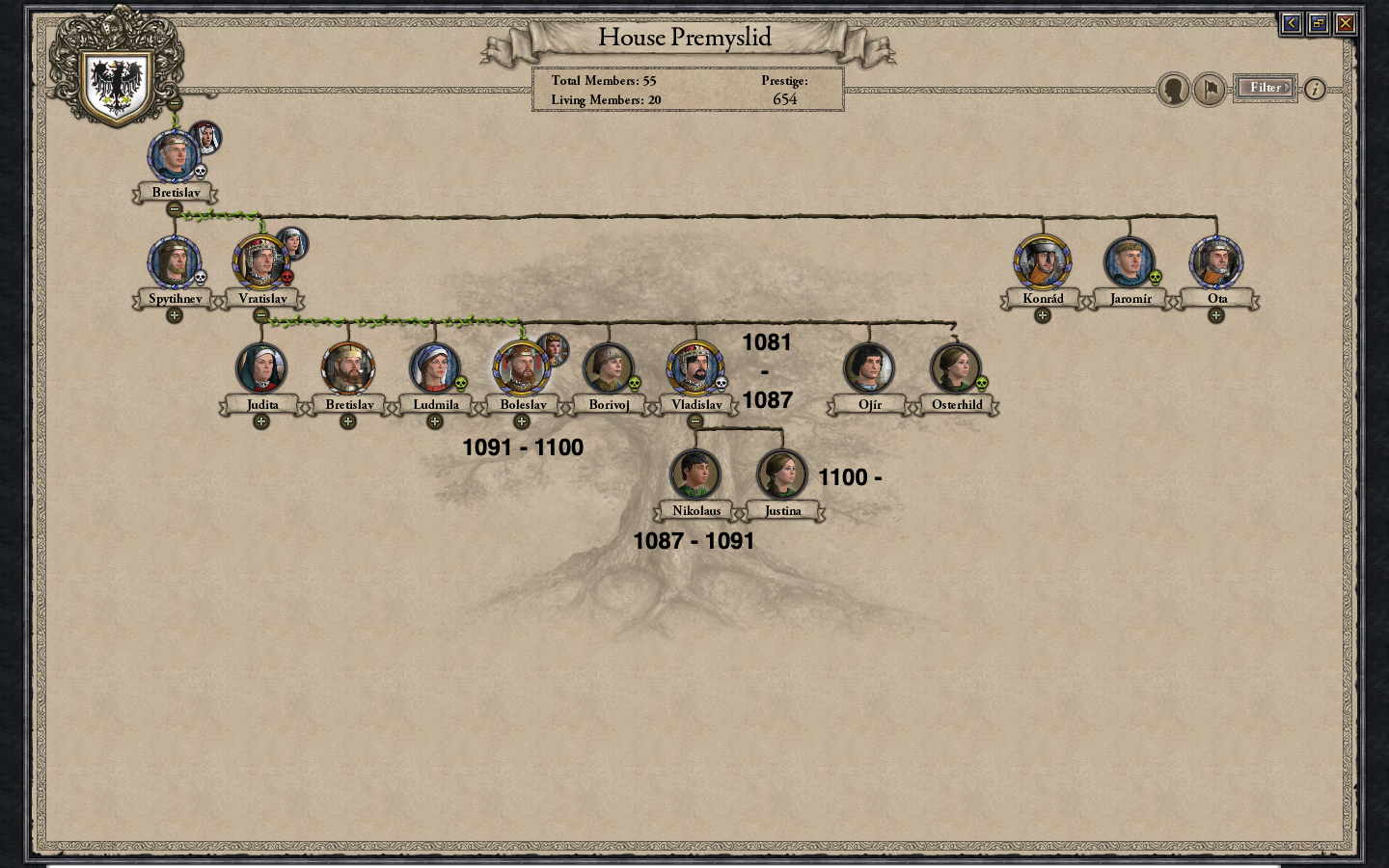
|
When we began our story, Poland was ruled by King Boleslaw II Piast, known as ‘the Bold.’ He died in 1078 in personal combat. Having no male heir, his eldest daughter Maria Piast took the throne, but she was deposed just years later in 1081 by Vladislav Premyslid, her cousin born from the union of Boleslaw’s sister and Vratislav, King of Bohemia. Vladislav died of an infected wound in 1087 and was survived by his heir, Nikolaus and a posthumous daughter, Justina. The King of Bohemia then won a second war in 1091 to replace Nikolaus with Vladislav’s older brother Boleslav, husband of Ida von Habsburg and father of Helferich von Habsburg, the new heir apparent of Poland.
Unfortunately King Vratislav, now a raging alcoholic apparently incapable of keeping a secret, left enough breadcrumbs for Kaiser Heinrich V’s Court Chaplain to follow and unmask him as a Satanist. Vratislav burned at the stake on 30 July 1093, and everything came unraveled all over again. His brother Konrád inherited Bohemia under the laws of seniority succession. Konrád was apparently miffed by the fact that his nephew, King Boleslav of Poland, had no heir of their dynasty. Fortunately, in April 1095, Anna Poraj, Duchess of Greater Poland, declares a revolt against Boleslav to return Maria Piast, now Duchess of Lesser Poland and Mazovia, to the throne. Although Justina has only a weak claim to Poland, the fact that the kingdom is now contested provides a sufficient reason for someone to press it for her. So Konrád spends a year preparing and then declares his own war on her behalf in September 1096. He beats Maria Piast to the finish line in 1100, and Justina Premyslid is crowned Queen Regnant of Poland.
For those keeping score at home, Poland has now had 5 changes of ruler in the past 22 years. That's a new monarch on average every five to six years (divide by 4 not 5 since you we don't know how long Justina will reign for). Boleslav by sheer luck managed to stay on the throne the longest, and he only reigned about nine years. *sighs deeply* Watch this space, because there will be more chaos in Poland in the future (note that Helferich von Habsburg, Boleslav and Ida's son, has a claim now), but thankfully not quite as complicated...so far as I know.
In other news from the year 1100, Amalie publishes her second paper, this one on heliocentricity. Despite objections to its publication by the Church, many readers are drawn in by how well-explained Amalie’s findings are, even to the layperson reader. She becomes known as ‘Amalie the Wise.’
Having managed to narrowly avoid the complete wrath of the Church, Amalie’s curiosity instead catches up to her in a different way. While raiding another Hermetic’s laboratory, she is captured and imprisoned by the owner, Count Theodoros Monomachos of Kaliopolis. When the news reaches Basel, the people are not entirely surprised by Amalie’s intractable search for ever more knowledge, but are nonetheless outraged that the Count of Kaliopolis would dare imprison their noble duchess.
The Pope declares the First Crusade a success on 7 May 1101, and grants the Kingdom of Jerusalem to Gerardo Fieschi. Amalie is disappointed but not surprised that her contribution proved too small and too late to win any new titles for the von Habsburgs in the Holy Land. It matters not, she tells herself. The Crusade was for the glory of God and his Son Jesus Christ, not my own family. Our ambitions lie closer to home.
While Amalie whittles away her time in Theodoros' dungeon, her liege Kaiser Heinrich V ‘the Frail’ is having his own struggle: he has a severe case of gout. In August 1101 the disease takes his life and the Prince-Electors select the Duke of Swabia, Wenzel von Pommern, as his successor.
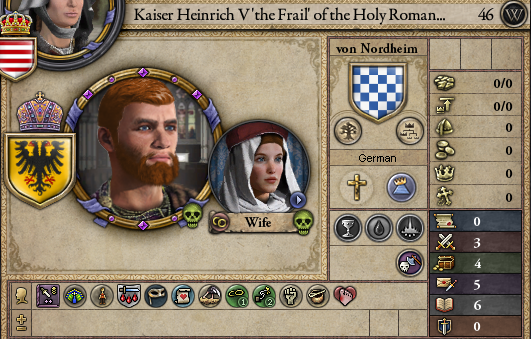
| 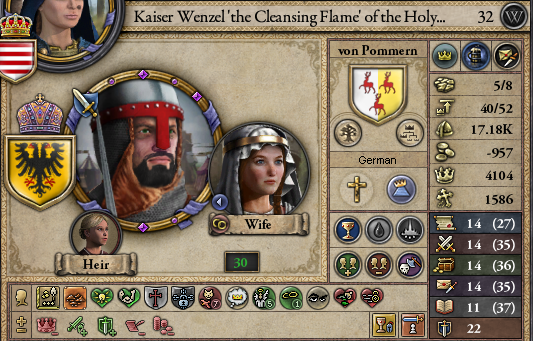
|
On 29 December of 1101, Amalie finally receives a visitor in her dungeon cell. It is none other than Count Theodoros himself, holding a letter in his hand.
“Well, my dear,” he greets her with a sly sarcastic sneer, “I believe both condolences and congratulations are in order, the former for the passing of your mother, and the latter for the passing of her throne to you.” He callously tosses the letter at Amalie’s feet. Amalie, dumbfounded, breaks the seal bearing the sigil of the Árpáds, and reads the letter. It is all too true. According to her mother’s chancellor, Prince Géza, Queen Mária of Hungary passed peacefully in her sleep on 13 November at the age of 51. Pope Alexander III took the decision to beatify her when the news reached Rome.

“I scarcely believe what I am reading,” Amalie says in the faintest of whispers, yet in the stillness of the dungeon air even her muted voice cuts through the silence like a knife.
“I knew if I only bided my time I could get a...queen’s ransom for you,” Count Theodoros remarks wryly. “And now, Queen Amalie of Hungary, I come bearing my offer. Two hundred and fifty gold pieces for your safe return.”

The Decline button is missing because I took the lazy approach and used the background of the duel message from last chapter, and both options wouldn't fit. The things you do when you don't feel like spending an hour meticulously erasing the background of a picture in Photoshop 
“I am tempted to quote Caesar when he was ransomed by the pirates, but I will not give you the satisfaction to extort me further. Two hundred and fifty and not a penny more, or you will bear witness to the righteous fury of my subjects and our allies. Furthermore, I must correct you in that there is no more Hungary, for I am no Magyar. My realm will take the name it was given by the Romans: Pannonia."
The ransom paid, Amalie rejoins her armies straightaway. The Crusade is over but she has inherited two wars in addition to the crown. The first her mother began to press a claim to the High Chiefdom of Bolghar for Prince Géza, who already holds the Duchy of Neutra. The other was declared by Duke Balc Jianu of Mutentia, a Wallachian vassal of the Pechenegs, to press his nephew Iorghu’s claim on the county of Temes.
As if two wars were not already enough, on the seventh of March 1102, Amalie receives a call to arms from Queen Justina of Poland, their alliance being renewed through the marriage of Amalie’s niece Sophie von Habsburg and Justina’s uncle Prince Ojír, who is now serving Amalie as her steward. Justina is still fighting Anna Poraj, but with her Hungarian helpers the rebels are all but eliminated and Duchess Anna will ultimately be imprisoned in 1104. Before she surrenders to Justina, though, Anna effectively flips the bird at her captor by signing over Poznań to her other foe, High Chief Waclaw 'the Fox' of Pomerania, on March 1st. Anna is locked up for the rest of her life, which turns out to only be another couple months, for she dies in her cell that June. Coincidentally, Maria Piast follows suit in October after contracting pneumonia.
In midsummer 1102, Amalie’s network of spies reports that on the eleventh of June, Captain Voitto Kukkonen died of cancer, the very death meant for his most famous victim, King Werner of Hungary. Amalie smiles and sheds a tear as she notes the irony.

While the loss of Werner might be mourned, the loss of his son Otto is clearly not, as witnessed by the actions of his widow. Gisèle d’Ivrea, still unmarried, gives birth on 25 September 1102 to Julienne de Gran, the baseborn daughter of the Duke of Transylvania, the aptly-titled Borisz ’the Lecher.’
Amalie, however, is too busy between wars and her work with the Hermetic Society to chastise her sister-in-law. About a month after the birth of Julienne, on 29 October, Amalie signs a white peace with chief Ernakh, having no real interest in the Bolghar lands nor expanding the influence of Prince Géza, who already controls a powerful duchy and could potentially claim her throne. The next year is spent mostly crushing the Mutenians, with a slight detour on 3 February 1103 to summon a Divine Being for a second time. Amalie has much more success and receives an epiphany.

11 days later, Prince Simon receives a wondrous present for his eighth birthday: a baby sister named Hildegard. And a big present she is, too, freakishly big, in fact, but the Habsburgs accept her into their family regardless, in fact almost more so for her unusual appearance. (Shocking!)

Over the summer of 1103, Amalie also oversees via correspondence the construction of a state-of-the-art remote laboratory, which is completed on 2 August. The Mutenians finally surrender weeks later on the twenty-fifth.
Her realm at long last at peace, Queen Amalie now faces an important decision. She summons a meeting of her council in Habsburg Castle on the first of April 1104.
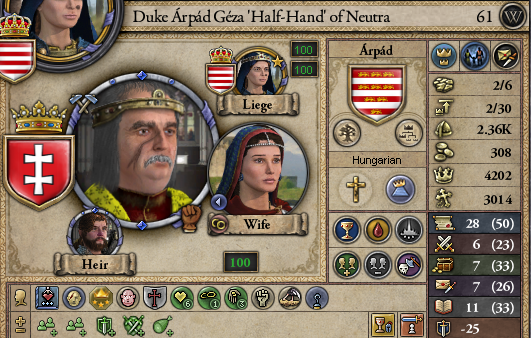
| 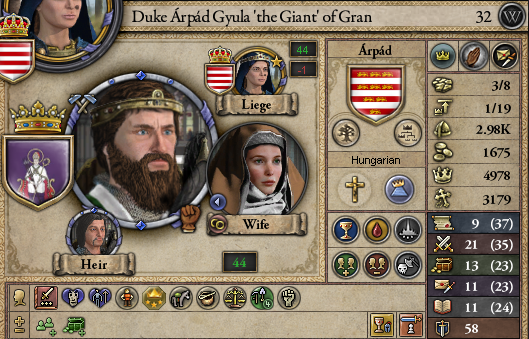
| 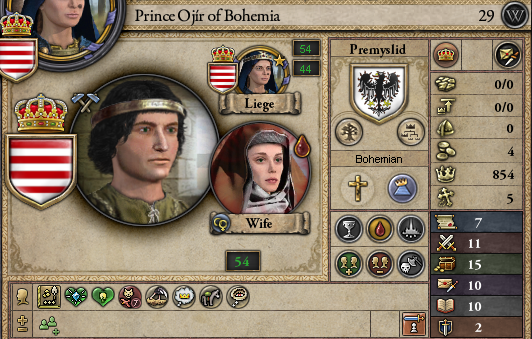
|
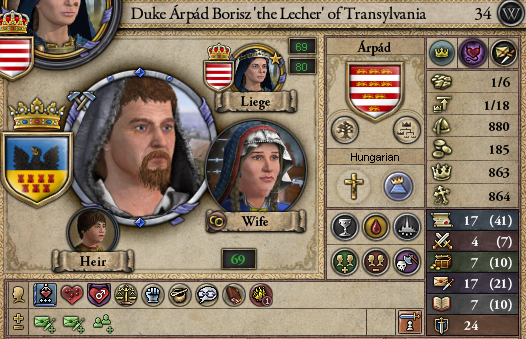
| 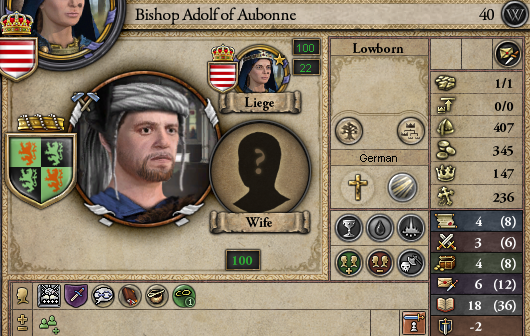
| 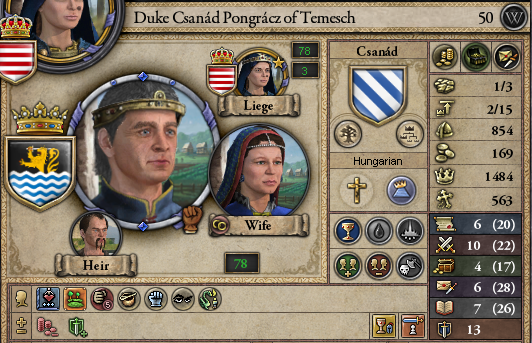
|
“My trusted advisors,” she begins, “through our joint efforts, and at the expense of many brave men, we have procured the security of our lands for the present time. However we must anticipate new threats, and seek to restore what was taken from us. My mother was a fair and wise queen, but even she could not hold off all of the many foes she faced in her time. In the East, the province of Szekelyföld was lost to the Pechenegs in 1075. In the West, Eisenburg was stolen in 1084 by the coward Adelbero Otakeren, the Duke of Steiermark. The restoration of these lands and the liberation of my mother’s people who live there must be a priority.
“Concurrently, we must protect my father’s lands here in Transjurania, which are now in potential jeopardy. As Queen of Pannonia I answer to no liege lord, and thus the Holy Roman Emperor may decide that this land is forfeit to him. I am loath to go to war with all of Germany, especially when our people are already weary from over three decades of near-constant conflict, but I understand if you are reluctant to have me pledge fealty to the Kaiser instead. I seek the wisdom of the council on these matters.”
The towering, hulking frame of Marshal Árpád Gyula, the Duke of Gran, rises first to speak. Perhaps his side of the family is where Hildegard gets her giant’s blood from, Amalie wonders.
“The Kings of Hungary have never bent the knee to another, but I concur with Her Majesty’s assessment of our military readiness. The people are exhausted, and I expect if we continue to siphon off men from the farms to fight in the army we could face a food crisis sooner than later. I also fear that the strength of the Empire is too much for us to handle ourselves, or even with our allies. We can field, as of the last tally, about 5,000 men. Adding in Poland gives us another 2,000. The last time I spoke with Prince Borisz,” he continued, gesturing at the spymaster, who was alternating looking at his reams of notes and staring lustily at Amalie, “he estimated the Kaiser’s total military capacity at 17,000. Unless the crown can afford 10,000 mercenaries, which I doubt, any war with the empire would be a waste of good men.” He sat back down.
“Prince Ojír, what do you have to say in concurrence or disagreement to Prince Gyula’s assessments?” Queen Amalie asks, addressing her steward. The young man takes his cue to stand and speak.
“Prince Gyula speaks accurately of our situation on both counts. Our winter stores were only just adequate. We need plenty of men back on the farms this year if we hope to live to see the next one. As for the suggestion of mercenaries, he is also right, the crown currently cannot take in enough revenue through taxes to support such numbers, nor do we have any reserves of coin anywhere near sufficient to last us through a war of that scale. I would also advise Her Majesty to submit to the emperor on the grounds that once a fellow vassal, she will be in a better position to renew the alliance with my home country and assist her if she requests aid.” He bowed his head respectfully and retook his seat, and Prince Borisz rose to take his place.
“I would like to confirm Prince Gyula’s assessments, as well,” he says passionately. “And concur with him and Prince Ojír that the safest option for the realm would be under the protection of the Holy Roman Empire. It could also open up possibilities to add to our allies, which we will need if we hope to reclaim Szekelyföld, as I regret to inform the council that the Pechenegs are now tributaries to the Greeks and under their protection.”
“I also agree,” cuts in Bishop Adolf of Aubonne, the court chaplain. “Her Majesty will also find more opportunities within the empire than without to reclaim the lost lands.”
“Sit down and wait your turn to speak, little man,” growls Duke Csanád Pongrácz of Temesch, ever quick to anger. “I personally am not inclined to see my home subsumed into the Kaiser’s dominions after centuries of independence and without a fight, but I see I am in the minority on this council, and I am not keen on dying in a hopeless war either. I have faith in my queen that whatever may befall us she will see that no harm will come our way.”
“Here, here!” come the boisterous voice of Prince Géza, the chancellor, his great belly shaking with every word. “I will second that sentiment and that of my colleagues on the council. I am called the Half-Hand,” he notes, displaying the glove on his left hand, the last few fingers of which are empty and hanging limp, “and the Lord help me if I should lose the other fighting the Kaiser, or worse yet, my head!”
“Then it seems the council is unanimous” Queen Amalie observes. “Well then, Chancellor, make good use of that one good hand of yours. You have a letter to write on my behalf.”
And so the following day, 2 April 1104 a courier is sent to Kaiser Wenzel von Pommern informing him of Queen Amalie’s desire to swear fealty.
On 15 September, in the midst of preparing for her coronation by the new Pope, Gregorious VII, Amalie suffers the loss of a partner for the second time. King Martín dies of natural causes at the age of 46. To add to her heartbreak, Amalie has only just recently discovered she is pregnant with their third child. At King Konrád of Bohemia’s suggestion, Amalie betroths herself to his grandson, 13-year-old Prince Ota to renew the old non-aggression pact between their realms, a decision she will later regret.

Without Martín being crowned King beside her, Amalie’s coronation as Queen Regnant of Pannonia on 29 November, 1104 is bittersweet. Her mood is somewhat lightened by thoughts of what her father Werner would have thought of seeing the Pope lay the Crown of Hungary on her head in such a magnificent ceremony. It was everything he had dreamed of.

Now confirmed as queen before God, Amalie’s attention turns to repairing her slightly fractured kingdom. Szekelyföld is out of reach, so long as the Byzantines defend the Pechenegs whom they have also converted to Orthodoxy. That leaves Eisenburg as the first logical target.
Amalie takes her advisors’ words to heart and seeks out a new possible ally: Duchess Romilda von Babenberg of Austria. Romilda is the widow of Adelbero’s late son Burchard, who’d died of dysentery eight years previous. After hosting Romilda in a private feast, the two reigning women become close friends, so close that Romilda is willing to matrilineally betroth her son and heir Alois to Amalie’s infant daughter Hildegard. Already resigned to Austria passing out of her family, Romilda decides to throw a wrench into the schemes of Alois’ grandfather, who controls the rightfully Austrian counties of Steyr and Traungau, and who had already demonstrated a disregard for his own kin by burning his own brother, Count Otakar of Eppenstein, at the stake for apostasy.

Surprisingly, Amalie doesn’t take the opportunity the betrothal provides to form an official alliance, though scholars debate whether this was intentional to avoid jeopardizing a new potential dynastic acquisition or due to an...oversight. Those on the latter side of the debate will also point out that Amalie similarly never formally allied with Konrád of Bohemia, despite Ojír’s request, although their opponents will usually make the counter-argument that Amalie could have already been planning at this early stage to seize Bohemia for her own family, so it was unlikely that she would overlook an ally on her enemy’s doorstep. All this author will say is:

Regardless of her intentions vis-à-vis Austria, Amalie wants to strike a different tone than her brother, so bolstered by her faith in her own rhetorical prowess, she sends a diplomatic missive to Duke Adelbero, requesting that he peacefully return Eisenburg and its attendant lands to the Kingdom of Pannonia. While she waits she gives birth on 14 April to her second son, whom she names Martin, in honor of the father who will never know him.

To call the Duke’s reply on 26 June 1105 unsatisfactory would be an understatement:
To the repulsive Amazon Amalie,
Eisenburg has been my possession for twenty years by right of conquest. I do not welcome war with you, but I will defend my lands the same way I won them from your mother: with the sword and the will of God on my side! Be forewarned, I count among my allies the Duke Heinrich Salian of Franconia, and my wife the Countess Adelaide of Ulm! You shall have to prevail against us all if you truly desire war!
Yours Truly,
Adelbero Otakeren
Duke of Steiermark, Count of Ulm and Count of Eisenburg

Amalie stares with pursed lips at that last title, clearly intentionally placed to provoke her. I’ll concede you the victory on that score, Adelbero. But you’ll find others difficult to come by.
“If Otakeren desires to fight to defend his stolen lands,” she intones calmly, despite the visible crumpling of the paper in her powerful hands, “then Pannonia will be honored to oblige his request.” She tosses the letter into the roaring fireplace behind her seat on the dais of the great hall. Although she turns away from the flames to face her council, they see the reflection of its fire in her eyes nonetheless. Their stomachs turn to stone and all words of objection are stopped in their throats as she gives her orders:
“Summon my officers, raise our levies and call the banners. We are going to war.”
Next Time…
Amalie and Adelbero’s power struggle shakes up the Holy Roman Empire.
Last edited:
- 2
Hello Habsburg fans!
I hope you all enjoyed chapter 6. It took a little longer than I expected; in my head I had planned to release this yesterday, but as I was collecting screenshots Friday morning I discovered that I made several errors, forgotten to include all of the Polish stuff, and realized that certain moments (like Amalie’s decision to swear fealty to the HRE) deserved a little more room to breathe than I originally gave them. I even discovered, in a surprising reversal of the usual situation, that I had a few extra screenshots of stuff I’d forgotten I’d recorded! So one day of rewrites later, here we are!
Anyway, that’s not the only reason why you’re getting a bonus post from me today. Chapter 7 is going to detail the war you already know is coming (and an even bigger one that you don’t!). The tricky bit is that I did not take nearly enough screenshots as I probably would have liked to do had I known at the time that I would be writing this AAR (hate to sound like a broken record with that phrase, but it is unfortunately going to come up a couple more times until we say goodbye to Amalie). Fortunately, I did make a save right before I ended the big war, so I have access to a list of all the battles and participants, and I hope I can use that to reverse-engineer the story of the war. I’ll be using the time-honored medieval historical tradition of taking the dots of information that IS known and connecting them with a plausible, if not 100% accurate, version of events.
I’m also considering editing together a short video clip to include in the chapter to amp up the emotion of the story (and yes, it will basically be a video meme in the fine tradition of this thread, but I won’t say more for risk of spoiling the surprise). However, that naturally comes with a lot of additional work that will need to be done before the chapter is ready to be released to you.
So expect a bit longer than usual wait for Chapter 7. I want to say no more than a full week, give or take a day or two, but I’m not holding myself to a strict deadline because I’m trying to have fun with this project, and if I go full pedal to the metal the end result will be less enjoyable for you, the readers, and I don’t want to do you all that kind of disservice.
So look forward to Chapter 7. Click here if you want to preview the title: The Wars of Amalie and Adelbero!
Best Wishes,
Green Rice
I hope you all enjoyed chapter 6. It took a little longer than I expected; in my head I had planned to release this yesterday, but as I was collecting screenshots Friday morning I discovered that I made several errors, forgotten to include all of the Polish stuff, and realized that certain moments (like Amalie’s decision to swear fealty to the HRE) deserved a little more room to breathe than I originally gave them. I even discovered, in a surprising reversal of the usual situation, that I had a few extra screenshots of stuff I’d forgotten I’d recorded! So one day of rewrites later, here we are!
Anyway, that’s not the only reason why you’re getting a bonus post from me today. Chapter 7 is going to detail the war you already know is coming (and an even bigger one that you don’t!). The tricky bit is that I did not take nearly enough screenshots as I probably would have liked to do had I known at the time that I would be writing this AAR (hate to sound like a broken record with that phrase, but it is unfortunately going to come up a couple more times until we say goodbye to Amalie). Fortunately, I did make a save right before I ended the big war, so I have access to a list of all the battles and participants, and I hope I can use that to reverse-engineer the story of the war. I’ll be using the time-honored medieval historical tradition of taking the dots of information that IS known and connecting them with a plausible, if not 100% accurate, version of events.
I’m also considering editing together a short video clip to include in the chapter to amp up the emotion of the story (and yes, it will basically be a video meme in the fine tradition of this thread, but I won’t say more for risk of spoiling the surprise). However, that naturally comes with a lot of additional work that will need to be done before the chapter is ready to be released to you.
So expect a bit longer than usual wait for Chapter 7. I want to say no more than a full week, give or take a day or two, but I’m not holding myself to a strict deadline because I’m trying to have fun with this project, and if I go full pedal to the metal the end result will be less enjoyable for you, the readers, and I don’t want to do you all that kind of disservice.
So look forward to Chapter 7. Click here if you want to preview the title: The Wars of Amalie and Adelbero!
Best Wishes,
Green Rice
- 2
Interesting... Amalie is indeed very wise.
Swearing fealty to the Holy Roman Emperor allows her and the Hapsburgs to bring down the Empire from within...
Swearing fealty to the Holy Roman Emperor allows her and the Hapsburgs to bring down the Empire from within...
Pledging to the HRE is probably the safest option, given how tricky it would be to establish and maintain alliances with enough powerful rulers outside of the empire. I see Amalie is also pursuing some rather esoteric subjects, but staying on the side of sanity while doing so
bring down the Empire from within...
*Gasp!* Bring it down? How dare you suggest something so blasphemous! We have to take it over, naturally!
A big and thoroughly enjoyable chapter - thank you, no doubt the extra spit and polish (and Polish) helped.

 Or even a demonic Otto granted day leave from the seventh circle of Hell.
Or even a demonic Otto granted day leave from the seventh circle of Hell.




Looking forward to the next instalment.
At least it’s not Lucifer’s Crew.Amalie joins the Hermetic Society
Excellent - gotta love a hands-on, brilliant and broad shouldered shield maiden.she declares her intent to go and join the troops still fighting in Hungary
Just watch out - don’t want to dial the wrong number and get the Great Grombledook or some such instead!Shortly thereafter, Amalie participates in the summoning of a Divine Being
Yes, dear reader, I Google Mapped the exact distance from Budapest to Jerusalem just for you.
lives by the fire, dies by the fire, heads down to the fiery place. A symmetry there.unmask him as a Satanist. Vratislav burned at the stake on 30 July 1093
Oh, how ignominious. And expensive.While raiding another Hermetic’s laboratory, she is captured and imprisoned by the owner, Count Theodoros Monomachos of Kaliopolis.
All this author will say is:
Good news for medieval man: another ferocious letting of peasant blood for royal ambition. What’s not to like?“Summon my officers, raise our levies and call the banners. We are going to war.”
Looking forward to the next instalment.
Chapter 7: The Wars of Amalie and Adalbero
Chapter 7: The Wars of Amalie and Adalbero
For all Adalbero’s many faults, a liar he proves not. The Franconians and the Ulmers answer his calls for aid when Amalie declares her war of reconquest.
However, it comes too little too late. By the time the Heinrich Salian and the armies of Franconia are within sight of the contested lands, Amalie and her generals have already sent the local militias packing.
“My lord, what is your command?” Heinrich’s commander-in-chief asks him. Heinrich pauses to think and stroke his thick black mustache. He is a stout man, not particularly well-suited to combat in any condition, but these circumstances leave no good options. He may be a Prince-Elector, but his forces are too small to break the lines of Pannonia. And yet to turn tail and escape back north would be dishonorable and do lasting damage to his family’s reputation.
“We will do Lord Otakeren no favor by throwing ourselves to the charnel pits outside his walls,” he finally answers. “We ride hard for Esztergom, or Gran as I believe they call it now. If we can cut off her supply lines and besiege a major city of her own, the Habsburg bitch might have to turn around and deal with us before she can think about taking Eisenburg.”
Even Heinrich himself, however, knows that this mission is a long shot, and to no one’s surprise it amounts to nothing. Amalie’s supply lines our rerouted to avoid the Franconians, and by the time Heinrich even arrives at the walls of Gran, she’s within spitting distance of fully occupying Adalbero’s personal holdings in Steiermark. Gran only has to endure a short siege before Heinrich pulls back in early 1106. The war is over, Amalie has won. However in choosing to attack the heart of Amalie’s dominions, he has walked the fine line between death and dishonor.
The next year, 1107, sees Ota Premyslid come of age. He and Queen Amalie marry, but it is apparent to all that with the age difference between them this will not be a passionate union.
The worst news was yet to come, however. In 1108, a new royal council is convened by Chancellor Karl of Bern. His predecessor Árpad Géza had passed away only the month before at the age of 64.
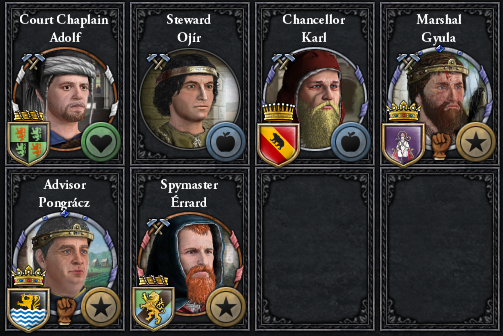
“Count Karl,” the queen inquires to start the meeting, “for what purpose have you deemed it necessary to call the council in person today?”
“Your Majesty, I bring ill news from Swabia. Our noble emperor Wenzel has gone to our Father in heaven. They suspect the flux took him.”
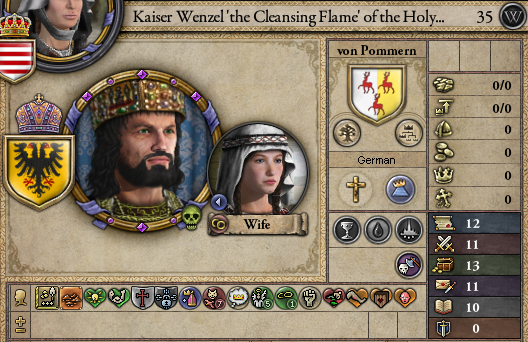
“That throne is cursed,” cut in Ojír, “Ever since Heinrich IV died the Lord has seen to take the lives of each of his successors before their time.”
“Perhaps it is punishment for Heinrich summoning my father away to die far away in the north,” Amalie mused. “Heinrich the Young followed my father to the grave with barely a year between them. But regardless, surely, my lord, there must be something else tied up in this. As my lord has pointed out, the death of a Kaiser is so common in these times that it hardly worth a carrier pidgeon, much less a council meeting. Who is our new liege? Who did the Electors choose?”
“Your Majesty sees straight to the point,” Karl flattered her. “I’m afraid the worst possible man has been selected for the throne: Duke Adalbero Otakeren of Steiermark!”
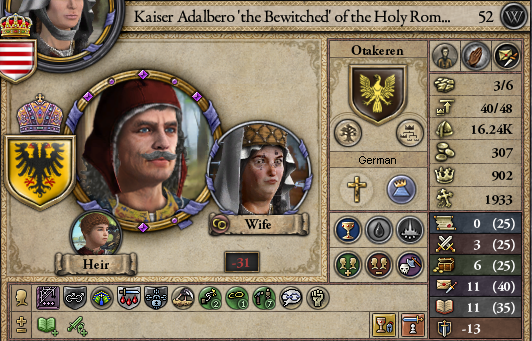
A gasp sweeps around the council chamber.
“Surely this cannot be true?” says Gyula in disbelief. “Who would find that craven worthy to be named Emperor of the Romans?”
“I’d wager Duke Adalbero’s piety was enough to convince the electors,” Karl explains. “Whatever their reasons, they made their choice and what is done is done. The new Kaiser is demanding his subjects come to Graz and renew their paths of fealty.”
“Even if I were inclined to swear loyalty to that man, I would not risk entering his viper pit,” Amalie bristles. The rest of the council nods their approval. “Send him some excuse but draft a renewal of my oath to send in writing.”
“There is one more thing you should know, my queen, before you make a final decision,” Ulrich objects. “In his request, Duke—erm, Kaiser, Adalbero added that should you refuse to appear in person, that he will declare the county of Gran forfeit.”
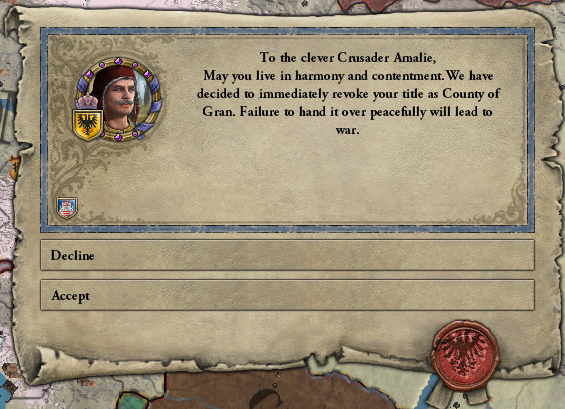
“Ridiculous!” shouts Gyula before Amalie can make a reply. “First he demands the princes of the Empire come to him and bend the knee in person, then he threatens to revoke titles? This demands a coordinated response from the princes.”
“it should be easy to sway many of the other lords of the realm to our side,” agrees Mayor Érraud of Nyon, the new spymaster(Duke Borisz had to be let go for getting into one too many scuffles with the married men of the court). “Adalbero is not only a kinslayer and a craven but excommunicated to boot. If other princes have received similar ultimatums, or even if they haven’t but we inform them of the one given us, they will flock to our defense.”
“I approve this approach,” says Gyula. “There is, as they say, strength in numbers, and if Adalbero intends to use strength of arms to enforce his demand we most certainly would not be able to repel him so long as he can recruit levies from the other princes.”
“Very well,” Amalie agrees, “Send out letters to all the other princes of the empire. Ask them to pledge to support me against the Kaiser, in letters only, hopefully, but with swords if necessary.”
It takes some time to send and receive back all the letters, but as Amalie awaits their replies, Adalbero grows impatient, having received no response from Amalie. On 29 November 1108, he sends another letter, declaring Amalie to be willfully flouting his authority and demanding Gran be surrendered or him immediately. The council is reconvened, and Amalie opens the session by asking Chancellor Karl what replies he has gotten already.
“Regrettably, my liege, I have already received a declination from the Duchess of Austria. I struggle to explain her reasoning, given your close personal friendship.”
“Romilda is no doubt biding her time to see whether Adalbero or myself will have the advantage, and even then I think she will hesitate to join us, with Steiermark her direct neighbor. Our enemy could consolidate his forces and attack her sooner than we can, with our forces being drawn from such far corners. Of course, it’s possible I’m entirely overthinking the matter, Romilda is not one for purely rational thought.”
“I’ll move on to the other responses, then, my lady,” Karl continued after waiting to make sure the queen did not start a new train of thought. “Franche-Comté has declined to support us, as have the Duchies of Milan, Baden, and Lower Lorraine.”
“Do you have any promising news, old codger, or are you determined to make the case for you to be replaced on this council by someone who can actually do your job as chief diplomat?” Gyula growls impatiently.
“I was merely saving the good news for last,” Karl insists. “We do have pledges of support from several other princes. The Dukes Guilhèm-Bertrand of Dauphiné and Borel of Provence were quick to reply, no doubt those Franks want to use the opportunity to weaken the empire and create an opening for them to leave, but for now I’m sure the extra three thousand troops will be appreciated. We also have pledges from the young Duke Gilbert of Nordgau and the Princess Christine of Swabia.”
“Ha!” Amalie laughs. “So Kaiserin Adelaide will be quite stuck between a rock and a hard place if hostilities start between her liege and her husband! Pardons, continue, Count Karl.”
“The brother-Dukes of Savoy and Susa have declared their support, as have Duchess Adela of Tyrol and the regent for Duke Meinhard’s son in Thurgau.”
“Meinhard is dead? What a shame,” Amalie interrupts again.
“And the latest positive replies I have as of this morning are from Hildegard of Alsace and Duke Dietrich of Upper Lorraine.”
“Out of all the names you’ve listed, only Dietrich, Guilhèm-Bertrand and Borel are men,” Gyula points out. “This is a rebellion of mostly children as it stands now.”
“Perhaps,” Amalie admits, “but the children do not need to fight themselves so long as the troops they provide can do that. How many of those do we estimate we have now?”
“If my sources are correct, which I trust they are, then to our own six thousand men these lords and ladies will add ten thousand more,” Érraud answers, “an amount equal to that which the Kaiser could summon to him now with all his subjects united.” Amalie turns to look back at Gyula, who is thoroughly gobsmacked.
“It would appear then, that these children taken together are quite the force to be reckoned with,” remarks Amalie smugly. “Very well, then. Even if this is all we can muster then it would appear that we are sufficiently prepared to challenge the Kaiser. Send out a second batch of messages to all the princes, starting with our new allies, and say to them this:
“I refuse Adalbero Otakeren’s ludicrous demand for my mother’s city and declare him to be a tyrant unfit for the throne. I call upon all true Christians and Romans to join me in demanding, by force of arms if necessary, his abdication of the Reichskrone and all his underlying titles, and to ask the Electors to reconvene and select a new Emperor to rule in his place. May God grant us victory in our just and righteous cause!”
Amalie’s declaration goes out, and as expected, Kaiser Adalbero sends out his own call for her capture. However, it appears that between his kinslaying and his excommunication by the pope have not engendered much love for him among his new subjects. In addition to those whom Amalie had already heard from, Bremen, Gelre, Holland, Friuli, the Rhine, Verona, Tuscany, Saxony, and even the Electors of Brandenburg and Bavaria declare for her. Amalie now has a force of 50,000 troops at her disposal. Adalbero has only seven thousand under his own command, but is bolstered by Konrád of Bohemia, who has just as many, Gottfried of Brabant, with another five thousand, Heinrich of Franconia and Alberto-Aziz of Milan with about three thousand each, and several other smaller lords in the north of the empire.
Amalie first makes a pre-emotive strike against Duke Guillaume of Franche-Comté. Guillaume is fighting his own war against Beatrice of Montbéliard, but they are both still loyal to Adalbero and have a sizeable army, so Amalie gathers together 3,000 troops from her own lands and her nearest allies’ and sends both foes fleeing from her borders.
With the rebel capital now in a less threatened position, Amalie further consolidated her army, amassing a force of nearly 17,000. Adalbero has chosen to besiege the archbishop of Mainz with what strength he has, but his main force is attempting to head south into Bavaria and either turn west to threaten Basel or east to join with Adalbero’s native Steiermarkers. Amalie, warned of this by a last-minute letter from the archbishop, wheels her own army north to head them off.
As they approach the Main River from the county of Weinsburg, Amalie’s scouts finally locate the enemy.
“The Kaiser is attempting to ford the river!” the scout reports. “I count about six thousands in his ranks, and when I left they had just begun to cross. If we leave to meet them immediately we can still catch them before they finish.”
“You look familiar, sir,” Amalie says, gazing long and hard at the scout’s red-bearded face. “Is that a Lombard accent which ai detect in your voice?”
“It is, your majesty. I was born in Italy but raised in Germany.”
“Lord above!” Amalie cries in recognition, “you are Gundo Lotharling!” Her guards draw their swords instinctively at the sound of the name. Gundo removes his cap and kneels before the rebel queen.
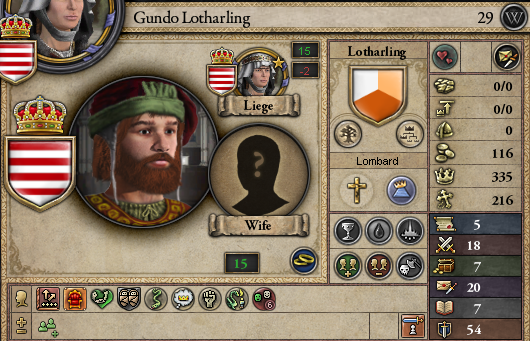
“I know you have every right to turn me away, or to order your guard to hack my head off here and now. It would be the least I deserve for the pain and suffering I caused you and your late brother. But I beg you, your majesty, grant me an opportunity to serve you and regain your trust. I believe in your cause, and would rather die attempting to protect the legacy of Otto von Habsburg than die without doing penance for my sins.”
Amalie pauses and considers the offer. Finally she signals her guards to sheathe their blades.
“Gundo,” she says, ”I understand you were trained for command and excelled in your studies. If you wish to prove your dedication to our cause, then take the center column and charge down my enemies at the spot you have found. Alberic and I will follow you from the flanks. If I detect the slightest amount of deception from you, if you give me any reason to doubt your intentions, I will ride up to you and ‘hack your head off’ myself, as you say. Do I make myself perfectly clear?” Gundo nods in silent agreement.
“Then go forth, General Gundo. May you find success on the battlefield, or else the death that you desire and which no one here would mourn.”
But if Amalie is hoping to rid herself of Gundo permanently in the battle, she is sorely disappointed in that regard. Quite to the contrary, Gundo thoroughly redeems himself, for the Battle of Weinsburg is a resounding success for the rebellion. Facing nearly thrice their own number whilst fording a river, the Loyalists are easily trounced, taking over 40% casualties, but Adalbero, ever the craven, stayed on the far side of the river and did not cross himself, and instead retreated with them back west to Mainz.
Amalie chooses not to cross the river to pursue Adalbero, despite her overwhelming numerical advantage. Instead she goes west along the banks to meet them at Mainz. The bishopric has already fallen, but outside the castle of Eppstein the Loyalist besiegers continue to hold her allies hostage. Fortunately there are even fewer troops here than at Weinsburg, only a bit over 2,000, and Amalie gives the deposed former King of Poland Boleslav Premyslid the honor of winning a battle (for once). Boleslav surrounds the enemy position and then leads a devastating cavalry charge. A full two-thirds of the enemy is killed or wounded, while the rest flee in terror. Unfortunately Adalbero himself once again slips through Amalie’s fingers, but she can still be proud of losing only 73 of their own troops in the entire battle.
Before recapturing Mainz, however, Amalie decides to address a new threat to the north: Konrád of Bohemia has arrived with nearly 3,500 men in Frankfurt-am-Main, where Adalbero joins him. A quick excursion later and both men and their armies (or rather, 58% of their armies) are sent packing.
Mainz is swiftly reclaimed from its tiny Loyalist garrison, and from this point on the war becomes more of a farce. The 16,000 or so troops that remain after the brief siege of Mainz, alerted by forward scouts, intercept a small contingent of 718 troops moving through Trier under Adalbero’s command and completely eliminate them all save the Kaiser himself, who flees immediately upon spotting the massive army descending on him. Meanwhile a second contingent of near 14,000 rebels similarly destroys a force of over a thousand attacking the city of Nyon in Genfergau county.
But by far the most pathetic loss for the Loyalists comes in the “Battle of Briey” in Metz, if it can be called a battle at all, for the enemy force consisted of Heinrich Salian, the Duke of Franconia, and 37 soldiers escorting him. All of the escorts are swarmed and killed, but Amalie orders the Duke unharmed and sends him on his way back to his primary residence in Wurzburg.
While Amalie has been collecting ludicrously easy victories, most of her Hungarian troops have captured Adalbero’s main castle of Graz. Faced with the surreal reality that he has been utterly defeated in only 10 short months, Adalbero surrenders to the rebel garrison defending his home on 24 September 1109. The Emperorship is given to Heinrich, Duke of Franconia, but Adalbero takes the Reichskrone with him, vowing that one day, an Otakeren will wear it again.
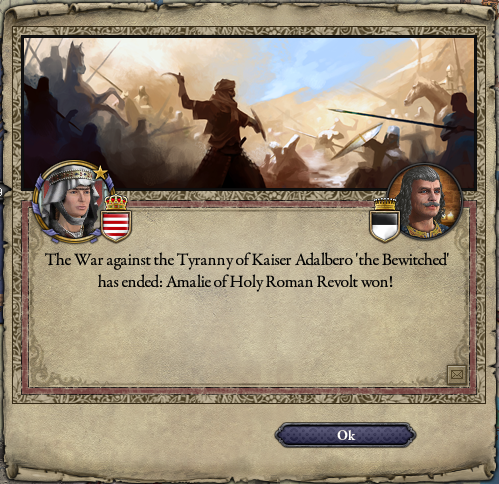
Next Time...
Amalie vastly expands the influence of the Habsburg dynasty, even at the price of breaking old bonds of fellowship.
For all Adalbero’s many faults, a liar he proves not. The Franconians and the Ulmers answer his calls for aid when Amalie declares her war of reconquest.
However, it comes too little too late. By the time the Heinrich Salian and the armies of Franconia are within sight of the contested lands, Amalie and her generals have already sent the local militias packing.
“My lord, what is your command?” Heinrich’s commander-in-chief asks him. Heinrich pauses to think and stroke his thick black mustache. He is a stout man, not particularly well-suited to combat in any condition, but these circumstances leave no good options. He may be a Prince-Elector, but his forces are too small to break the lines of Pannonia. And yet to turn tail and escape back north would be dishonorable and do lasting damage to his family’s reputation.
“We will do Lord Otakeren no favor by throwing ourselves to the charnel pits outside his walls,” he finally answers. “We ride hard for Esztergom, or Gran as I believe they call it now. If we can cut off her supply lines and besiege a major city of her own, the Habsburg bitch might have to turn around and deal with us before she can think about taking Eisenburg.”
Even Heinrich himself, however, knows that this mission is a long shot, and to no one’s surprise it amounts to nothing. Amalie’s supply lines our rerouted to avoid the Franconians, and by the time Heinrich even arrives at the walls of Gran, she’s within spitting distance of fully occupying Adalbero’s personal holdings in Steiermark. Gran only has to endure a short siege before Heinrich pulls back in early 1106. The war is over, Amalie has won. However in choosing to attack the heart of Amalie’s dominions, he has walked the fine line between death and dishonor.
The next year, 1107, sees Ota Premyslid come of age. He and Queen Amalie marry, but it is apparent to all that with the age difference between them this will not be a passionate union.
The worst news was yet to come, however. In 1108, a new royal council is convened by Chancellor Karl of Bern. His predecessor Árpad Géza had passed away only the month before at the age of 64.

“Count Karl,” the queen inquires to start the meeting, “for what purpose have you deemed it necessary to call the council in person today?”
“Your Majesty, I bring ill news from Swabia. Our noble emperor Wenzel has gone to our Father in heaven. They suspect the flux took him.”

“That throne is cursed,” cut in Ojír, “Ever since Heinrich IV died the Lord has seen to take the lives of each of his successors before their time.”
“Perhaps it is punishment for Heinrich summoning my father away to die far away in the north,” Amalie mused. “Heinrich the Young followed my father to the grave with barely a year between them. But regardless, surely, my lord, there must be something else tied up in this. As my lord has pointed out, the death of a Kaiser is so common in these times that it hardly worth a carrier pidgeon, much less a council meeting. Who is our new liege? Who did the Electors choose?”
“Your Majesty sees straight to the point,” Karl flattered her. “I’m afraid the worst possible man has been selected for the throne: Duke Adalbero Otakeren of Steiermark!”

A gasp sweeps around the council chamber.
“Surely this cannot be true?” says Gyula in disbelief. “Who would find that craven worthy to be named Emperor of the Romans?”
“I’d wager Duke Adalbero’s piety was enough to convince the electors,” Karl explains. “Whatever their reasons, they made their choice and what is done is done. The new Kaiser is demanding his subjects come to Graz and renew their paths of fealty.”
“Even if I were inclined to swear loyalty to that man, I would not risk entering his viper pit,” Amalie bristles. The rest of the council nods their approval. “Send him some excuse but draft a renewal of my oath to send in writing.”
“There is one more thing you should know, my queen, before you make a final decision,” Ulrich objects. “In his request, Duke—erm, Kaiser, Adalbero added that should you refuse to appear in person, that he will declare the county of Gran forfeit.”

“Ridiculous!” shouts Gyula before Amalie can make a reply. “First he demands the princes of the Empire come to him and bend the knee in person, then he threatens to revoke titles? This demands a coordinated response from the princes.”
“it should be easy to sway many of the other lords of the realm to our side,” agrees Mayor Érraud of Nyon, the new spymaster(Duke Borisz had to be let go for getting into one too many scuffles with the married men of the court). “Adalbero is not only a kinslayer and a craven but excommunicated to boot. If other princes have received similar ultimatums, or even if they haven’t but we inform them of the one given us, they will flock to our defense.”
“I approve this approach,” says Gyula. “There is, as they say, strength in numbers, and if Adalbero intends to use strength of arms to enforce his demand we most certainly would not be able to repel him so long as he can recruit levies from the other princes.”
“Very well,” Amalie agrees, “Send out letters to all the other princes of the empire. Ask them to pledge to support me against the Kaiser, in letters only, hopefully, but with swords if necessary.”
It takes some time to send and receive back all the letters, but as Amalie awaits their replies, Adalbero grows impatient, having received no response from Amalie. On 29 November 1108, he sends another letter, declaring Amalie to be willfully flouting his authority and demanding Gran be surrendered or him immediately. The council is reconvened, and Amalie opens the session by asking Chancellor Karl what replies he has gotten already.
“Regrettably, my liege, I have already received a declination from the Duchess of Austria. I struggle to explain her reasoning, given your close personal friendship.”
“Romilda is no doubt biding her time to see whether Adalbero or myself will have the advantage, and even then I think she will hesitate to join us, with Steiermark her direct neighbor. Our enemy could consolidate his forces and attack her sooner than we can, with our forces being drawn from such far corners. Of course, it’s possible I’m entirely overthinking the matter, Romilda is not one for purely rational thought.”
“I’ll move on to the other responses, then, my lady,” Karl continued after waiting to make sure the queen did not start a new train of thought. “Franche-Comté has declined to support us, as have the Duchies of Milan, Baden, and Lower Lorraine.”
“Do you have any promising news, old codger, or are you determined to make the case for you to be replaced on this council by someone who can actually do your job as chief diplomat?” Gyula growls impatiently.
“I was merely saving the good news for last,” Karl insists. “We do have pledges of support from several other princes. The Dukes Guilhèm-Bertrand of Dauphiné and Borel of Provence were quick to reply, no doubt those Franks want to use the opportunity to weaken the empire and create an opening for them to leave, but for now I’m sure the extra three thousand troops will be appreciated. We also have pledges from the young Duke Gilbert of Nordgau and the Princess Christine of Swabia.”
“Ha!” Amalie laughs. “So Kaiserin Adelaide will be quite stuck between a rock and a hard place if hostilities start between her liege and her husband! Pardons, continue, Count Karl.”
“The brother-Dukes of Savoy and Susa have declared their support, as have Duchess Adela of Tyrol and the regent for Duke Meinhard’s son in Thurgau.”
“Meinhard is dead? What a shame,” Amalie interrupts again.
“And the latest positive replies I have as of this morning are from Hildegard of Alsace and Duke Dietrich of Upper Lorraine.”
“Out of all the names you’ve listed, only Dietrich, Guilhèm-Bertrand and Borel are men,” Gyula points out. “This is a rebellion of mostly children as it stands now.”
“Perhaps,” Amalie admits, “but the children do not need to fight themselves so long as the troops they provide can do that. How many of those do we estimate we have now?”
“If my sources are correct, which I trust they are, then to our own six thousand men these lords and ladies will add ten thousand more,” Érraud answers, “an amount equal to that which the Kaiser could summon to him now with all his subjects united.” Amalie turns to look back at Gyula, who is thoroughly gobsmacked.
“It would appear then, that these children taken together are quite the force to be reckoned with,” remarks Amalie smugly. “Very well, then. Even if this is all we can muster then it would appear that we are sufficiently prepared to challenge the Kaiser. Send out a second batch of messages to all the princes, starting with our new allies, and say to them this:
“I refuse Adalbero Otakeren’s ludicrous demand for my mother’s city and declare him to be a tyrant unfit for the throne. I call upon all true Christians and Romans to join me in demanding, by force of arms if necessary, his abdication of the Reichskrone and all his underlying titles, and to ask the Electors to reconvene and select a new Emperor to rule in his place. May God grant us victory in our just and righteous cause!”
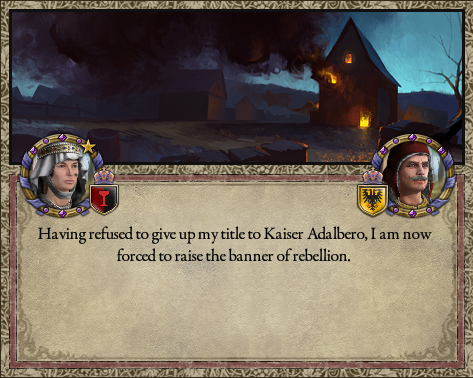
| 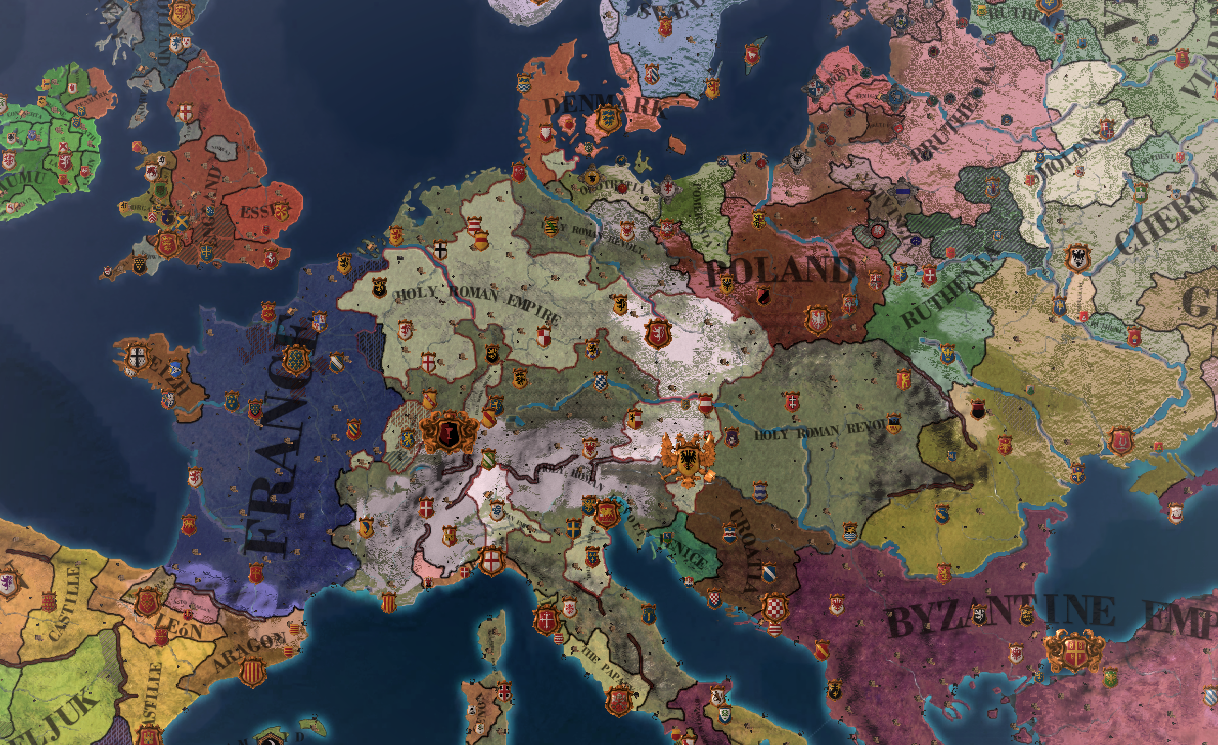
|
Amalie’s declaration goes out, and as expected, Kaiser Adalbero sends out his own call for her capture. However, it appears that between his kinslaying and his excommunication by the pope have not engendered much love for him among his new subjects. In addition to those whom Amalie had already heard from, Bremen, Gelre, Holland, Friuli, the Rhine, Verona, Tuscany, Saxony, and even the Electors of Brandenburg and Bavaria declare for her. Amalie now has a force of 50,000 troops at her disposal. Adalbero has only seven thousand under his own command, but is bolstered by Konrád of Bohemia, who has just as many, Gottfried of Brabant, with another five thousand, Heinrich of Franconia and Alberto-Aziz of Milan with about three thousand each, and several other smaller lords in the north of the empire.
Amalie first makes a pre-emotive strike against Duke Guillaume of Franche-Comté. Guillaume is fighting his own war against Beatrice of Montbéliard, but they are both still loyal to Adalbero and have a sizeable army, so Amalie gathers together 3,000 troops from her own lands and her nearest allies’ and sends both foes fleeing from her borders.
With the rebel capital now in a less threatened position, Amalie further consolidated her army, amassing a force of nearly 17,000. Adalbero has chosen to besiege the archbishop of Mainz with what strength he has, but his main force is attempting to head south into Bavaria and either turn west to threaten Basel or east to join with Adalbero’s native Steiermarkers. Amalie, warned of this by a last-minute letter from the archbishop, wheels her own army north to head them off.
As they approach the Main River from the county of Weinsburg, Amalie’s scouts finally locate the enemy.
“The Kaiser is attempting to ford the river!” the scout reports. “I count about six thousands in his ranks, and when I left they had just begun to cross. If we leave to meet them immediately we can still catch them before they finish.”
“You look familiar, sir,” Amalie says, gazing long and hard at the scout’s red-bearded face. “Is that a Lombard accent which ai detect in your voice?”
“It is, your majesty. I was born in Italy but raised in Germany.”
“Lord above!” Amalie cries in recognition, “you are Gundo Lotharling!” Her guards draw their swords instinctively at the sound of the name. Gundo removes his cap and kneels before the rebel queen.

“I know you have every right to turn me away, or to order your guard to hack my head off here and now. It would be the least I deserve for the pain and suffering I caused you and your late brother. But I beg you, your majesty, grant me an opportunity to serve you and regain your trust. I believe in your cause, and would rather die attempting to protect the legacy of Otto von Habsburg than die without doing penance for my sins.”
Amalie pauses and considers the offer. Finally she signals her guards to sheathe their blades.
“Gundo,” she says, ”I understand you were trained for command and excelled in your studies. If you wish to prove your dedication to our cause, then take the center column and charge down my enemies at the spot you have found. Alberic and I will follow you from the flanks. If I detect the slightest amount of deception from you, if you give me any reason to doubt your intentions, I will ride up to you and ‘hack your head off’ myself, as you say. Do I make myself perfectly clear?” Gundo nods in silent agreement.
“Then go forth, General Gundo. May you find success on the battlefield, or else the death that you desire and which no one here would mourn.”
But if Amalie is hoping to rid herself of Gundo permanently in the battle, she is sorely disappointed in that regard. Quite to the contrary, Gundo thoroughly redeems himself, for the Battle of Weinsburg is a resounding success for the rebellion. Facing nearly thrice their own number whilst fording a river, the Loyalists are easily trounced, taking over 40% casualties, but Adalbero, ever the craven, stayed on the far side of the river and did not cross himself, and instead retreated with them back west to Mainz.
Amalie chooses not to cross the river to pursue Adalbero, despite her overwhelming numerical advantage. Instead she goes west along the banks to meet them at Mainz. The bishopric has already fallen, but outside the castle of Eppstein the Loyalist besiegers continue to hold her allies hostage. Fortunately there are even fewer troops here than at Weinsburg, only a bit over 2,000, and Amalie gives the deposed former King of Poland Boleslav Premyslid the honor of winning a battle (for once). Boleslav surrounds the enemy position and then leads a devastating cavalry charge. A full two-thirds of the enemy is killed or wounded, while the rest flee in terror. Unfortunately Adalbero himself once again slips through Amalie’s fingers, but she can still be proud of losing only 73 of their own troops in the entire battle.
Before recapturing Mainz, however, Amalie decides to address a new threat to the north: Konrád of Bohemia has arrived with nearly 3,500 men in Frankfurt-am-Main, where Adalbero joins him. A quick excursion later and both men and their armies (or rather, 58% of their armies) are sent packing.
Mainz is swiftly reclaimed from its tiny Loyalist garrison, and from this point on the war becomes more of a farce. The 16,000 or so troops that remain after the brief siege of Mainz, alerted by forward scouts, intercept a small contingent of 718 troops moving through Trier under Adalbero’s command and completely eliminate them all save the Kaiser himself, who flees immediately upon spotting the massive army descending on him. Meanwhile a second contingent of near 14,000 rebels similarly destroys a force of over a thousand attacking the city of Nyon in Genfergau county.
But by far the most pathetic loss for the Loyalists comes in the “Battle of Briey” in Metz, if it can be called a battle at all, for the enemy force consisted of Heinrich Salian, the Duke of Franconia, and 37 soldiers escorting him. All of the escorts are swarmed and killed, but Amalie orders the Duke unharmed and sends him on his way back to his primary residence in Wurzburg.
While Amalie has been collecting ludicrously easy victories, most of her Hungarian troops have captured Adalbero’s main castle of Graz. Faced with the surreal reality that he has been utterly defeated in only 10 short months, Adalbero surrenders to the rebel garrison defending his home on 24 September 1109. The Emperorship is given to Heinrich, Duke of Franconia, but Adalbero takes the Reichskrone with him, vowing that one day, an Otakeren will wear it again.

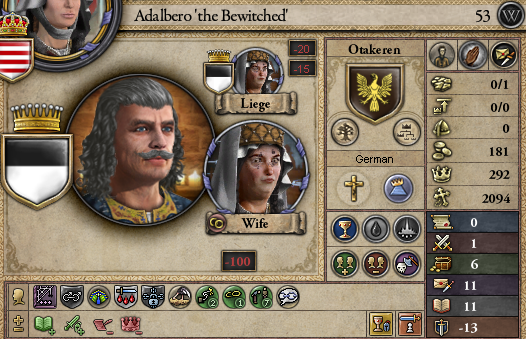
| 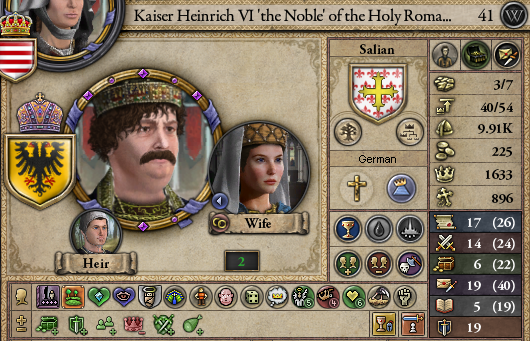
|
Next Time...
Amalie vastly expands the influence of the Habsburg dynasty, even at the price of breaking old bonds of fellowship.
Last edited:
- 1
- 1
Chapter 8: Bohemian Rhapsody
Chapter 8: Bohemian Rhapsody
The year is 1110 and Amalie von Habsburg is enjoying her life. She has defeated her unofficial rival Adelbero Otakeren twice and established a reputation as not only a scholar but an unassailable military powerhouse. She has even managed to secure a strategic marriage between her own daughter and the heir to the Duchy of Austria, Alois Otakeren, who since the abdication of his grandfather had become Duke of Steiermark in his own right.
Amalie is on a roll to expand the Habsburg dominions into Austria, and she decides to double-down on that path. South of Steiermark, the Duchy of Krain is ruled by a toddler, Meinhard II, who also holds the title Duke of Thurgau. One letter to the Pope later and Amalie has license to claim Krain for her own. The war is so straightforward and uneventful that most historians in Basel barely mention it. Amalie’s Transjuranian armies capture Thurgau while the Hungarian portion seizes Krain, and with minimal effort the realms of the Habsburgs is expanded yet again.
Amalie also decides to further enhance the family position in Bavaria by breaking off the betrothal between her son Simon and her niece Elisabeth. The previous match between Simon and Jelena Dukljanin had been scrapped in favor of hopefully passing down the combination of Elisabeth’s strong build and Simon’s genius to the next generation, but the opportunity to add Swabia, the seat of the very same Kaiser Amalie has first pledged fealty to, is too good to pass up.
Elsewhere in the Empire, things have gone crazy yet again. Kaiser Heinrich VI, who was promptly excommunicated by the pope after being elected emperor (what else is new?) is facing a rebellion to depose him in favor of Konrád of Bohemia, led by Duke Guilhèm-Bertrand of Dauphiné. The Pope, it seems, may not favor Heinrich but the Lord certainly does not favor the conspirators. Duke Guilhèm-Bertrand dies on the orders of his own sister, Countess Rosa of Traungau, and his son, Guilhèm-Bertrand II, dies of consumption at the tender age of 7 a little more than a year later, on New Year’s day 1113. The new Duke of Dauphiné, 5-year-old Dodon, is directed by his regent and uncle Berenguié, to regain the favor of God for the house of d’Albon by offering terms of surrender to the Kaiser. Heinrich at this point has already captured and imprisoned the one-eyed, one-handed Konràd, so in his kind heart he finds empathy for the young lord of Dauphiné and accepts on 30 January 1113.
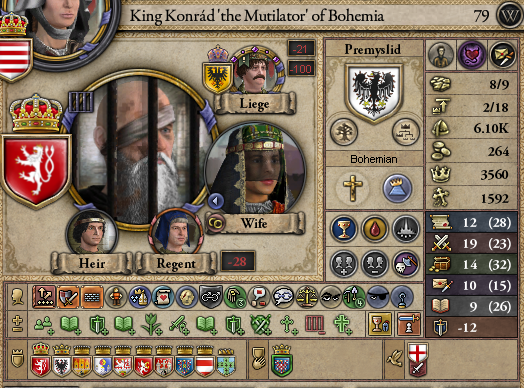
The imprisonment of Konrád turns out to be a godsend to the von Habsburg family, as their claims to the Bohemian throne are sketchy, but the regency provides an opening. However, they’ll have to be quick about it, as Konràd is 78 and will not survive long in a dungeon cell. For now, though, Austria has Amalie’s full attention. On 11 November, she restores the county of Pettau to her newly-acquired Duchy of Krain, wresting it from its liege lord, the Prince-Bishop of Salzburg, Cardinal Markward ‘the Purifier.’ Amalie is so confident in her victory she even takes time away from the front lines to organize a Grand Debate in the Hermetic Society, which she wins, and after the war she sets to work on reforming the succession of Pannonia. On April 15, 1114, she promulgates a new succession law, designating Simon as sole heir to all her titles.
With all her own ducks in a row, Amalie can now finally devote some thought to Bohemia. The problem, as her Chancellor Karl points out, is that she is married to Ota Premyslid, Konrád’s grandson, thus enforcing a pact of non-aggression between herself and Bohemia. Amalie weighs her options carefully.
If I do not press Helferich’s claim within his own lifetime, it is unlikely any children of his would be considered a viable candidate to the throne if a future opportunity should present itself, she muses. And with a male-only seniority succession law, a weak claim to Bohemia will not be easy to press. I must act now if Bohemia is ever to go to my family. She calls for her spymaster.
And then in a completely unrelated, unexpected turn of events, King Ota dies of poisoned wine on 3 November, the perpetrator suspiciously never caught.
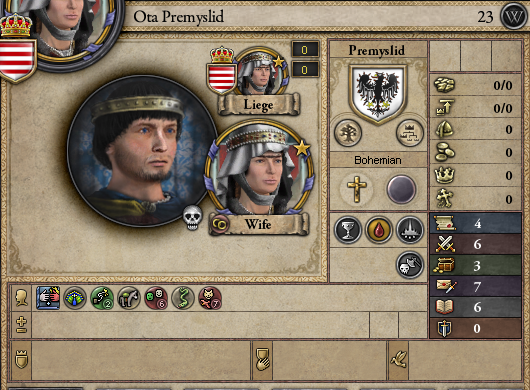
With the non-aggression pact between her and King Konrád now conveniently null and void, Amalie is free to declare a war to press her nephew Helferich’s claim on Bohemia. She promptly receives a letter from Kaiser Heinrich VI attempting to enforce a peace, but Amalie, an official advisor to the Kaiser, reminds him of her previous assistance on his council, and Heinrich agrees to cancel the proclamation.
Amalie marries her third husband, an Irish bishop’s son named Cynwrig Mathrafal. He is a tall and brilliant soldier, full of ambition and steadfastly dedicated to honing his martial craft, and becomes fast friends with most everyone in his new home, but Amalie notices that he seems not entirely eager to consummate the marriage on their wedding night. Ah, well, she is past 40 now, unlikely to bear anymore children, and her passion was always more in her research than the bedroom anyhow. In fact, it had become a source of tension with Ota and soured their marriage. She’s willing to look the other way when it comes to Cynwrig’s…preferences if it affords her more time to unraveling the secrets of the universe.
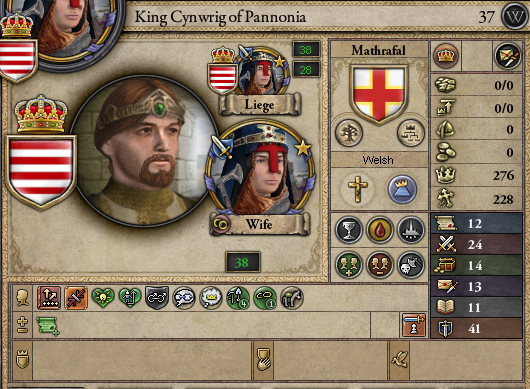
That agreement pays dividends on 29 October 1115, when Amalie finishes her Magnum Opus on Transmutative Alchemy, coincidentally 31 years to the day her brother obtained the Necronomicon, which had mysteriously vanished after his passing.
With her book finished, Amalie can devote more time to the war effort, and after a winter’s pause, the war only takes a few more months to wrap up. On 31 May 1116, Amalie and Helferich declare victory in the streets of Praha, now to be called Prag. It takes another eleven months for Konràd, now merely Duke of Bohemia but still an Elector, to pass and be succeeded in both capacities by his nephew and Amalie’s longtime steward, Prince Ojír. Ojír seems rather relieved to have an excuse to leave his council post. His affection for Amalie’s betrayal of the long-standing Habsburg-Premyslid alliance has turned poisonously bitter.
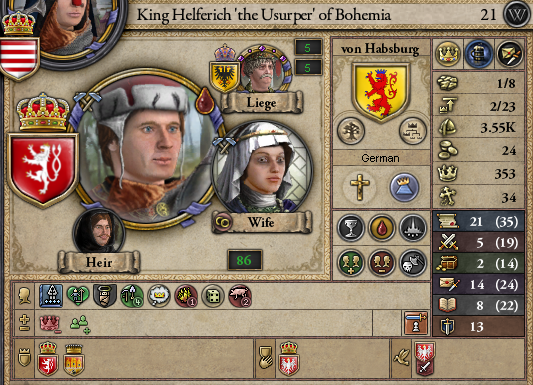
Now with an army of his own, Helferich, reveling in this newfound power, decides in July 1117 to undertake the now-traditional Bohemian War to Replace Whoever's In Charge of Poland. Unlike the previous wars, however, this time the aggressors is making use of his claim to the Polish throne, currently held by his cousin Queen Justina Premyslid. It is said that when the Poles learned that yet another King of Bohemia was seeking to depose their monarch, they either barely seemed to take notice or remarked that he’d better be prepared to stand in line.
While this has been going on, Countess Adelaide of Ulm finally succumbed to the Great Pox which had plagued her for many years on 26 August, 1116, and her son with Adelbero, Otakar, took up her seat and renewed Ulm’s vassalage to Princess Christine of Swabia.
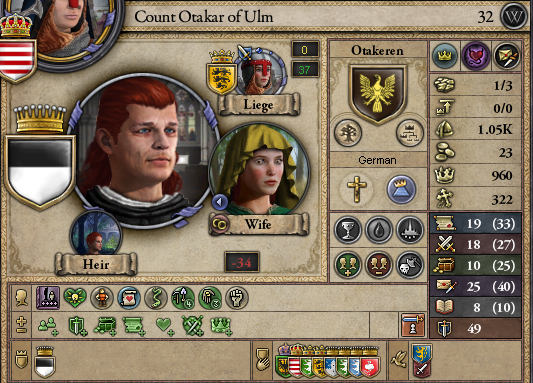
Valentine’s Day 1119 arrives, and in the spirit of love, Amalie’s eldest daughter Princess Hildegard, on that day turned 16, matrilineally marries the Duke of Steiermark, Alois Otakeren. If they should produce an heir, the lands of the once-proud house of Otakeren would be reduced to the single county of Ulm on Alois’ passing. Meanwhile the Habsburgs would control a realm that would stretch from the Carpathians to the borders of Tyrol and from Poland to the Adriatic without interruption.
Apparently this is for some reason distasteful to Prince Ojír, Duke of Bohemia, because in 1120 he declares a war to reclaim his family’s throne. Amalie decides to lend her troops to the cause to tip the scales in Helferich’s favor, personally leading two victories against Ojír’s forces outside the gates of Prag as they repeatedly attempt to besiege the capital.
The same year, Otakar declares himself rightful Duke of Swabia through his mother’s father. Amalie jumps to her daughter-in-law’s defense, personally leading her armies in a successful attempt to break the siege of Württemberg. Otakar and his forces are decimated by the superior numbers.
King Helferich von Habsburg of Bohemia’s reign comes to a premature end on 9 November 1121, when he dies a mangled mess from wounds sustained on the battlefield. According to the succession laws of Bohemia, which are still based on seniority, the throne immediately passes to his cousin Simon, who now stands to be king of three realms: Bohemia, Pannonia, and if he can successfully finish the war his cousin started, Poland.
Simon quickly sets to work establishing himself as the uncontested ruler of his unexpected windfall of a kingdom. On 22 January 1122, he accepts the surrender of Prince Ojír and allows him to retain his lands and titles. Ojír unfortunately also retains his pride, ambition, and stubborn refusal to accept his near miss at the crown.
1122 is a generally good year for the Habsburgs and their allies. Just six days after Simon’s victory over Ojír, his brother Martin celebrates the victory of his fellow Children’s Crusaders in Jerusalem, led by the youngest son of King Konrád of Bohemia, also named Konrád. The Kingdom, which had fallen to a Jihad in 1105, was now back in the hands of the church. Once again, however, the Habsburgs are snubbed when the Holy Land is parceled out to the Crusaders, and Martin remains a loyal courtier of the new King Konràd across the sea, but no more.
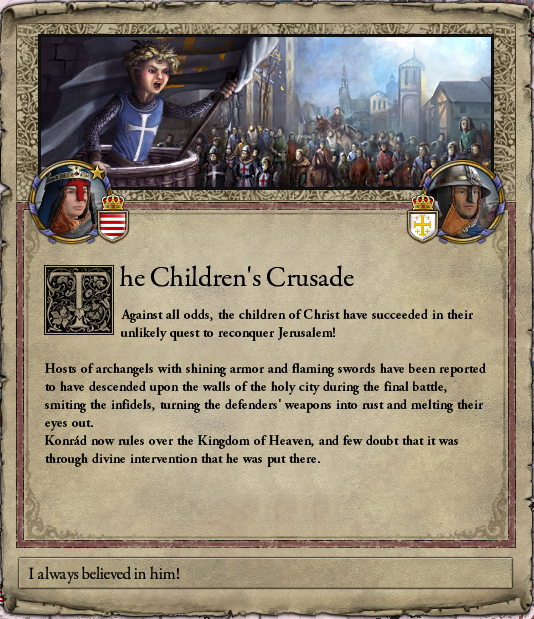
More good news comes on the third of April, when Princess Christine accepts the surrender of Otakar ‘the Bear’ and imprisons him under house arrest in Augsburg. Amalie goes to visit him and runs into Adelbero of all people!
“Come to gloat at us, your highness?” he asks, venom dripping in the last word. “See how low you and your family have reduced the house of my forefathers?”
“Fine words from the man who has absconded with a crown he is no longer entitled to wear. Where are you keeping it, Adelbero?”
“Perhaps you will find out one day, my dear, but not today,” he answers with a smirk. “Today I have come to talk with my last remaining son, not to you.”
“I hope you can talk reason into him as his father, and as one who also has experience fighting and losing to my family.”
“I can assure you that his lusts for power, among other things, will be a topic of conversation, but I will not fault him for taking a stand against a family of power-hungry usurpers from the backwaters of the empire. Your crown and your son’s are stolen from the noble families who’ve held them for generations.”
“And the first generation of Premyslids or Árpáds or Piasts or even Otakerens, how did they acquire those crowns?” Amalie inquires rhetorically. “They conquered, just as my family has done.”
“Your father used the Premyslids to subjugate the Árpáds, you’ve used the Árpáds to depose the Premyslids, and now your son is using the Premyslids to depose themselves in Poland. Your conquests were borne on the backs of other families. All your family has done is beguile and betray those around it.”
“And your house’s founder, Otakar, for whom you named your son, did he conquer Steiermark all by his lonesome? Nay, he brought an army. Do you suggest that the families of the men who fought for him deserve a piece of your grandson’s titles? For they bore his ancestor’s conquests the same as my allies bore mine.”
“Do not attempt to compare my family or the families you’ve exploited to the peasant rabble! Consider your present situation, Queen Amalie. Who among the nobility will ally you or your descendants after all this? You are steadily burning every bridge with them, and when there are no more to defend you, will you turn to the peasantry? I think not. Now if you’ll at last excuse me, I’m going to speak with my son.” Amalie lets him go and waits patiently for the next hour or two, passing the time with conversation with her daughter-in-law Christine. She and Simon have already had their first two children, Gertrude, born 28 February 1119, and another daughter, Elisabeth, in August of 1120, and Amalie enjoys fussing over her granddaughters. At last a page comes to inform them that Lord Adelbero has left. Amalie then goes with Christine to talk to Otakar.
“I’m sorry to not present to you as some miserable wretch begging for mercy,” Otakar says, clearly channeling his father’s spite. “In truth, there is something to be said about having all my time to myself now, which I can devote to my prayers and poetry.”
“Prayers and poetry,” Amalie echoes. “I know you and you’re blood better than that. You may feign piety but you are plotting something from behind here.”
“Are you implying I intended to be captured, your majesty?”
“No, I don’t think you would have risked it, even considering my daughter-in-law’s gentle soul. I think your being in here was a product of foolishness, but I doubt you’ll just sit here and write bad verse and be content.”
“Keep a close eye on him always,” she warns Christine in hushed tones as they return to her apartments. “He may be a prisoner, but he has a claim to the emperorship through his father. Be wary, child, the motives he professes are likely a façade, but what his true intentions are, I do not know, nor care to guess, lest I spend too long in the depraved mind of his ilk.”
While the Fourth (!) Bohemian-Polish War drags on, Simon and Christine somehow find time to produce two more children. Irmgard is born in September of 1123, and their first son, also named Simon, comes along in October of 1125. Simon unfortunately never gets to meet Irmgard, for she was a very frail child and had died that previous January. In fact, judging by the timeline, it was his father’s grief over Irmgard that led to the younger Simon’s conception. And the Lord appeared to take pity on the couple in their loss, for He not only blessed them with a son and heir but a handsome, burly, and genius heir at that!
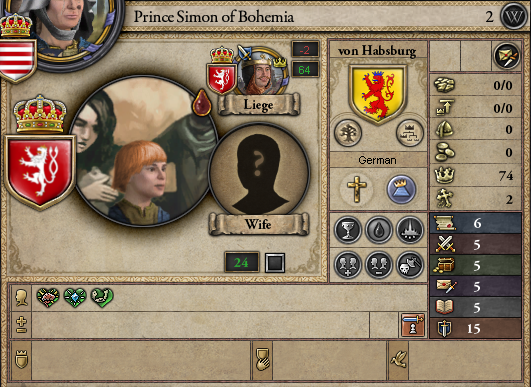
Finally on Christmas Day 1126, Simon finishes the war for Poland his cousin started. After much effort, Poland is now a Habsburg domain and a constituent realm of the Holy Roman Empire. But while all may be good for Simon, like her half-brother before her, Amalie falls into a depression after hearing an endless stream of supplicants. Rather than brew a Draught of Eudaimon as she has done in the past to relieve stress, Amalie decides to instead concoct a poison with her acquired alchemical skills and drinks it on 22 March 1128, closing out her 54 years of life. A fitting end to the greatest Hermetic of her generation.
Next Time...
King Simon further consolidates his three kingdoms and deals with the fickleness of the Electoral College.
The year is 1110 and Amalie von Habsburg is enjoying her life. She has defeated her unofficial rival Adelbero Otakeren twice and established a reputation as not only a scholar but an unassailable military powerhouse. She has even managed to secure a strategic marriage between her own daughter and the heir to the Duchy of Austria, Alois Otakeren, who since the abdication of his grandfather had become Duke of Steiermark in his own right.
Amalie is on a roll to expand the Habsburg dominions into Austria, and she decides to double-down on that path. South of Steiermark, the Duchy of Krain is ruled by a toddler, Meinhard II, who also holds the title Duke of Thurgau. One letter to the Pope later and Amalie has license to claim Krain for her own. The war is so straightforward and uneventful that most historians in Basel barely mention it. Amalie’s Transjuranian armies capture Thurgau while the Hungarian portion seizes Krain, and with minimal effort the realms of the Habsburgs is expanded yet again.
Amalie also decides to further enhance the family position in Bavaria by breaking off the betrothal between her son Simon and her niece Elisabeth. The previous match between Simon and Jelena Dukljanin had been scrapped in favor of hopefully passing down the combination of Elisabeth’s strong build and Simon’s genius to the next generation, but the opportunity to add Swabia, the seat of the very same Kaiser Amalie has first pledged fealty to, is too good to pass up.
Elsewhere in the Empire, things have gone crazy yet again. Kaiser Heinrich VI, who was promptly excommunicated by the pope after being elected emperor (what else is new?) is facing a rebellion to depose him in favor of Konrád of Bohemia, led by Duke Guilhèm-Bertrand of Dauphiné. The Pope, it seems, may not favor Heinrich but the Lord certainly does not favor the conspirators. Duke Guilhèm-Bertrand dies on the orders of his own sister, Countess Rosa of Traungau, and his son, Guilhèm-Bertrand II, dies of consumption at the tender age of 7 a little more than a year later, on New Year’s day 1113. The new Duke of Dauphiné, 5-year-old Dodon, is directed by his regent and uncle Berenguié, to regain the favor of God for the house of d’Albon by offering terms of surrender to the Kaiser. Heinrich at this point has already captured and imprisoned the one-eyed, one-handed Konràd, so in his kind heart he finds empathy for the young lord of Dauphiné and accepts on 30 January 1113.

The imprisonment of Konrád turns out to be a godsend to the von Habsburg family, as their claims to the Bohemian throne are sketchy, but the regency provides an opening. However, they’ll have to be quick about it, as Konràd is 78 and will not survive long in a dungeon cell. For now, though, Austria has Amalie’s full attention. On 11 November, she restores the county of Pettau to her newly-acquired Duchy of Krain, wresting it from its liege lord, the Prince-Bishop of Salzburg, Cardinal Markward ‘the Purifier.’ Amalie is so confident in her victory she even takes time away from the front lines to organize a Grand Debate in the Hermetic Society, which she wins, and after the war she sets to work on reforming the succession of Pannonia. On April 15, 1114, she promulgates a new succession law, designating Simon as sole heir to all her titles.
With all her own ducks in a row, Amalie can now finally devote some thought to Bohemia. The problem, as her Chancellor Karl points out, is that she is married to Ota Premyslid, Konrád’s grandson, thus enforcing a pact of non-aggression between herself and Bohemia. Amalie weighs her options carefully.
If I do not press Helferich’s claim within his own lifetime, it is unlikely any children of his would be considered a viable candidate to the throne if a future opportunity should present itself, she muses. And with a male-only seniority succession law, a weak claim to Bohemia will not be easy to press. I must act now if Bohemia is ever to go to my family. She calls for her spymaster.
And then in a completely unrelated, unexpected turn of events, King Ota dies of poisoned wine on 3 November, the perpetrator suspiciously never caught.

With the non-aggression pact between her and King Konrád now conveniently null and void, Amalie is free to declare a war to press her nephew Helferich’s claim on Bohemia. She promptly receives a letter from Kaiser Heinrich VI attempting to enforce a peace, but Amalie, an official advisor to the Kaiser, reminds him of her previous assistance on his council, and Heinrich agrees to cancel the proclamation.
Amalie marries her third husband, an Irish bishop’s son named Cynwrig Mathrafal. He is a tall and brilliant soldier, full of ambition and steadfastly dedicated to honing his martial craft, and becomes fast friends with most everyone in his new home, but Amalie notices that he seems not entirely eager to consummate the marriage on their wedding night. Ah, well, she is past 40 now, unlikely to bear anymore children, and her passion was always more in her research than the bedroom anyhow. In fact, it had become a source of tension with Ota and soured their marriage. She’s willing to look the other way when it comes to Cynwrig’s…preferences if it affords her more time to unraveling the secrets of the universe.

That agreement pays dividends on 29 October 1115, when Amalie finishes her Magnum Opus on Transmutative Alchemy, coincidentally 31 years to the day her brother obtained the Necronomicon, which had mysteriously vanished after his passing.
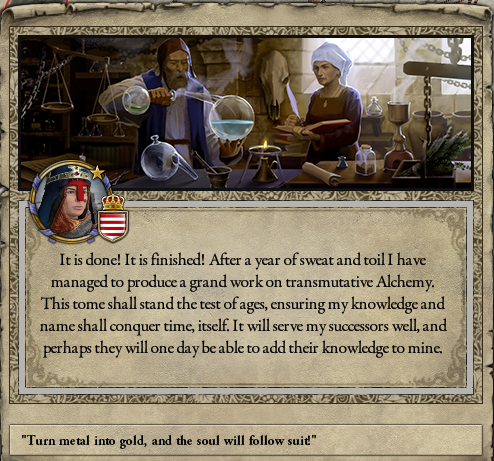
| 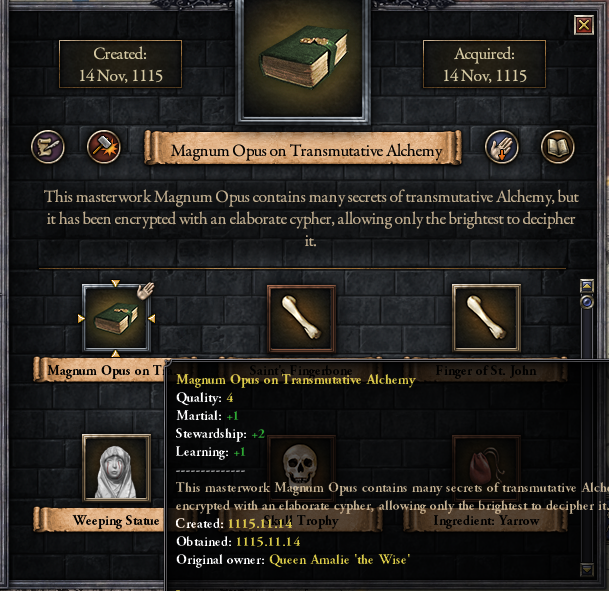
|
With her book finished, Amalie can devote more time to the war effort, and after a winter’s pause, the war only takes a few more months to wrap up. On 31 May 1116, Amalie and Helferich declare victory in the streets of Praha, now to be called Prag. It takes another eleven months for Konràd, now merely Duke of Bohemia but still an Elector, to pass and be succeeded in both capacities by his nephew and Amalie’s longtime steward, Prince Ojír. Ojír seems rather relieved to have an excuse to leave his council post. His affection for Amalie’s betrayal of the long-standing Habsburg-Premyslid alliance has turned poisonously bitter.

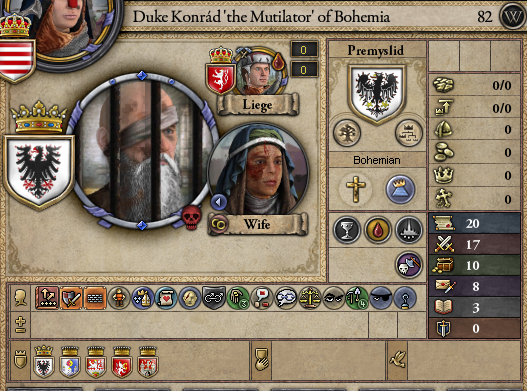
| 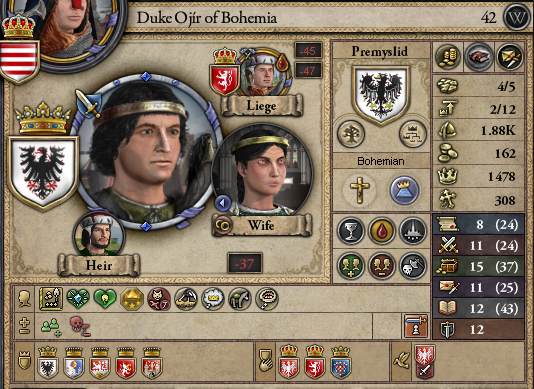
|
Now with an army of his own, Helferich, reveling in this newfound power, decides in July 1117 to undertake the now-traditional Bohemian War to Replace Whoever's In Charge of Poland. Unlike the previous wars, however, this time the aggressors is making use of his claim to the Polish throne, currently held by his cousin Queen Justina Premyslid. It is said that when the Poles learned that yet another King of Bohemia was seeking to depose their monarch, they either barely seemed to take notice or remarked that he’d better be prepared to stand in line.
While this has been going on, Countess Adelaide of Ulm finally succumbed to the Great Pox which had plagued her for many years on 26 August, 1116, and her son with Adelbero, Otakar, took up her seat and renewed Ulm’s vassalage to Princess Christine of Swabia.

Valentine’s Day 1119 arrives, and in the spirit of love, Amalie’s eldest daughter Princess Hildegard, on that day turned 16, matrilineally marries the Duke of Steiermark, Alois Otakeren. If they should produce an heir, the lands of the once-proud house of Otakeren would be reduced to the single county of Ulm on Alois’ passing. Meanwhile the Habsburgs would control a realm that would stretch from the Carpathians to the borders of Tyrol and from Poland to the Adriatic without interruption.
Apparently this is for some reason distasteful to Prince Ojír, Duke of Bohemia, because in 1120 he declares a war to reclaim his family’s throne. Amalie decides to lend her troops to the cause to tip the scales in Helferich’s favor, personally leading two victories against Ojír’s forces outside the gates of Prag as they repeatedly attempt to besiege the capital.
The same year, Otakar declares himself rightful Duke of Swabia through his mother’s father. Amalie jumps to her daughter-in-law’s defense, personally leading her armies in a successful attempt to break the siege of Württemberg. Otakar and his forces are decimated by the superior numbers.
King Helferich von Habsburg of Bohemia’s reign comes to a premature end on 9 November 1121, when he dies a mangled mess from wounds sustained on the battlefield. According to the succession laws of Bohemia, which are still based on seniority, the throne immediately passes to his cousin Simon, who now stands to be king of three realms: Bohemia, Pannonia, and if he can successfully finish the war his cousin started, Poland.
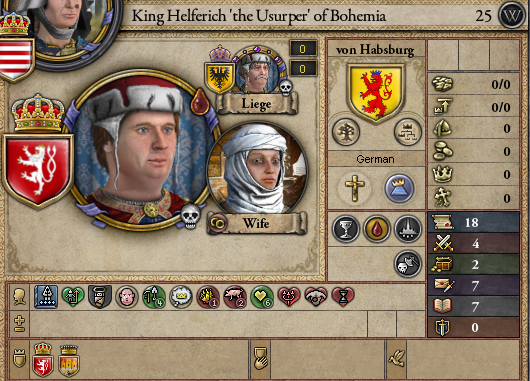
| 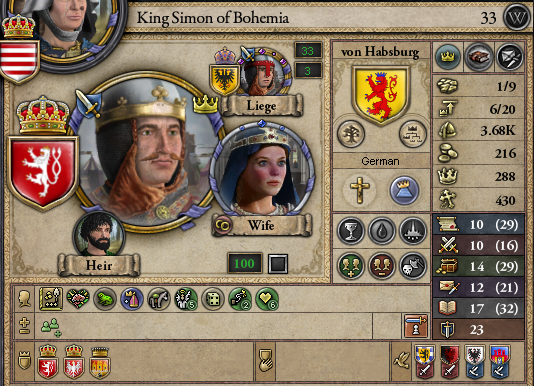
|
Simon quickly sets to work establishing himself as the uncontested ruler of his unexpected windfall of a kingdom. On 22 January 1122, he accepts the surrender of Prince Ojír and allows him to retain his lands and titles. Ojír unfortunately also retains his pride, ambition, and stubborn refusal to accept his near miss at the crown.
1122 is a generally good year for the Habsburgs and their allies. Just six days after Simon’s victory over Ojír, his brother Martin celebrates the victory of his fellow Children’s Crusaders in Jerusalem, led by the youngest son of King Konrád of Bohemia, also named Konrád. The Kingdom, which had fallen to a Jihad in 1105, was now back in the hands of the church. Once again, however, the Habsburgs are snubbed when the Holy Land is parceled out to the Crusaders, and Martin remains a loyal courtier of the new King Konràd across the sea, but no more.

More good news comes on the third of April, when Princess Christine accepts the surrender of Otakar ‘the Bear’ and imprisons him under house arrest in Augsburg. Amalie goes to visit him and runs into Adelbero of all people!
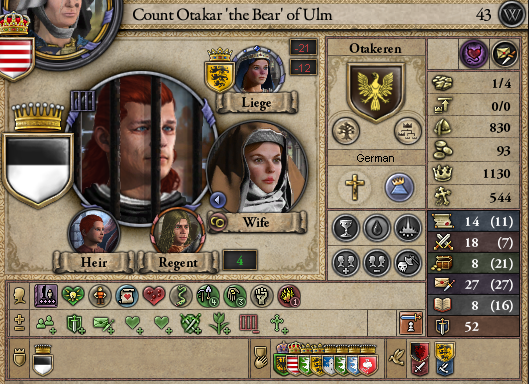
| 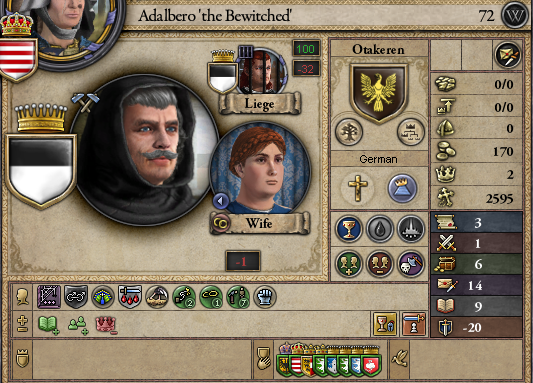
|
“Come to gloat at us, your highness?” he asks, venom dripping in the last word. “See how low you and your family have reduced the house of my forefathers?”
“Fine words from the man who has absconded with a crown he is no longer entitled to wear. Where are you keeping it, Adelbero?”
“Perhaps you will find out one day, my dear, but not today,” he answers with a smirk. “Today I have come to talk with my last remaining son, not to you.”
“I hope you can talk reason into him as his father, and as one who also has experience fighting and losing to my family.”
“I can assure you that his lusts for power, among other things, will be a topic of conversation, but I will not fault him for taking a stand against a family of power-hungry usurpers from the backwaters of the empire. Your crown and your son’s are stolen from the noble families who’ve held them for generations.”
“And the first generation of Premyslids or Árpáds or Piasts or even Otakerens, how did they acquire those crowns?” Amalie inquires rhetorically. “They conquered, just as my family has done.”
“Your father used the Premyslids to subjugate the Árpáds, you’ve used the Árpáds to depose the Premyslids, and now your son is using the Premyslids to depose themselves in Poland. Your conquests were borne on the backs of other families. All your family has done is beguile and betray those around it.”
“And your house’s founder, Otakar, for whom you named your son, did he conquer Steiermark all by his lonesome? Nay, he brought an army. Do you suggest that the families of the men who fought for him deserve a piece of your grandson’s titles? For they bore his ancestor’s conquests the same as my allies bore mine.”
“Do not attempt to compare my family or the families you’ve exploited to the peasant rabble! Consider your present situation, Queen Amalie. Who among the nobility will ally you or your descendants after all this? You are steadily burning every bridge with them, and when there are no more to defend you, will you turn to the peasantry? I think not. Now if you’ll at last excuse me, I’m going to speak with my son.” Amalie lets him go and waits patiently for the next hour or two, passing the time with conversation with her daughter-in-law Christine. She and Simon have already had their first two children, Gertrude, born 28 February 1119, and another daughter, Elisabeth, in August of 1120, and Amalie enjoys fussing over her granddaughters. At last a page comes to inform them that Lord Adelbero has left. Amalie then goes with Christine to talk to Otakar.
“I’m sorry to not present to you as some miserable wretch begging for mercy,” Otakar says, clearly channeling his father’s spite. “In truth, there is something to be said about having all my time to myself now, which I can devote to my prayers and poetry.”
“Prayers and poetry,” Amalie echoes. “I know you and you’re blood better than that. You may feign piety but you are plotting something from behind here.”
“Are you implying I intended to be captured, your majesty?”
“No, I don’t think you would have risked it, even considering my daughter-in-law’s gentle soul. I think your being in here was a product of foolishness, but I doubt you’ll just sit here and write bad verse and be content.”
“Keep a close eye on him always,” she warns Christine in hushed tones as they return to her apartments. “He may be a prisoner, but he has a claim to the emperorship through his father. Be wary, child, the motives he professes are likely a façade, but what his true intentions are, I do not know, nor care to guess, lest I spend too long in the depraved mind of his ilk.”
While the Fourth (!) Bohemian-Polish War drags on, Simon and Christine somehow find time to produce two more children. Irmgard is born in September of 1123, and their first son, also named Simon, comes along in October of 1125. Simon unfortunately never gets to meet Irmgard, for she was a very frail child and had died that previous January. In fact, judging by the timeline, it was his father’s grief over Irmgard that led to the younger Simon’s conception. And the Lord appeared to take pity on the couple in their loss, for He not only blessed them with a son and heir but a handsome, burly, and genius heir at that!

Finally on Christmas Day 1126, Simon finishes the war for Poland his cousin started. After much effort, Poland is now a Habsburg domain and a constituent realm of the Holy Roman Empire. But while all may be good for Simon, like her half-brother before her, Amalie falls into a depression after hearing an endless stream of supplicants. Rather than brew a Draught of Eudaimon as she has done in the past to relieve stress, Amalie decides to instead concoct a poison with her acquired alchemical skills and drinks it on 22 March 1128, closing out her 54 years of life. A fitting end to the greatest Hermetic of her generation.
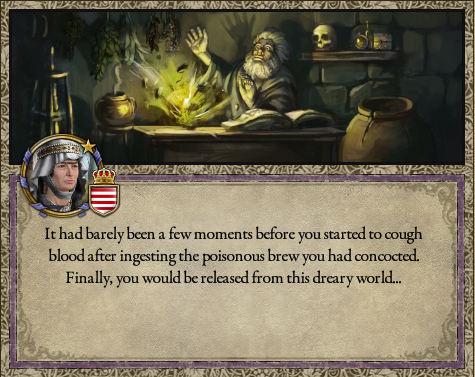
| 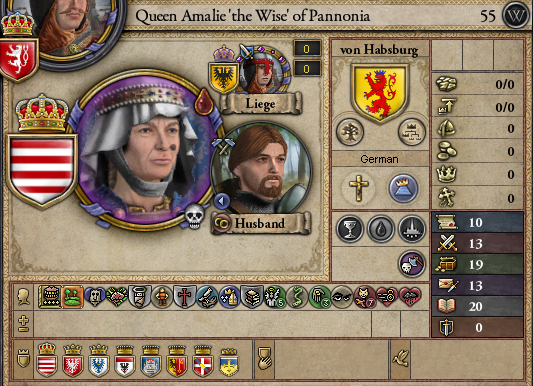
|
A number of you are probably grumbling at my decision to again end my own character, especially one as badass as Amalie. My main reason for doing so was that I wanted to take control of Simon and be in a better position to hold on to Bohemia and Poland, plus try to switch succession laws for both of them as soon as possible. Do I consider my reasoning appropriate justification in hindsight? Ehh...somewhat, not entirely.
With that said, I have pledged myself not to repeat this move for any future ruler, so the grumblings I received last time when I engineered Otto’s death have not gone unheard. Unfortunately, by the time that chapter was published I had already offed Amalie, so I was kinda stuck regarding this chapter! Sorry!
With that said, I have pledged myself not to repeat this move for any future ruler, so the grumblings I received last time when I engineered Otto’s death have not gone unheard. Unfortunately, by the time that chapter was published I had already offed Amalie, so I was kinda stuck regarding this chapter! Sorry!
Next Time...
King Simon further consolidates his three kingdoms and deals with the fickleness of the Electoral College.
- 2
Hello Habsburg Fans!
Thank you for your patience with waiting for Chapter 7! I admit that I took much longer than I expected. The video (which after all that I can't get to work ) was actually finished last Monday, but then EU4 Emperor dropped and I got mildly super-distracted!
) was actually finished last Monday, but then EU4 Emperor dropped and I got mildly super-distracted! 
So I'm rewarding your patience with a double-issue today! When we pick up we will be on a new ruler, one who has lots of screenshots for me to pour over and string together into a compelling narrative! Yay!!!!!
Also new will be my new computer which I'll be playing and writing on as of Friday or Saturday, depending on what time the kind and hopefully very gentle and not at all clumsy UPS man arrives at my house. I'm really looking forward to that, as I've been playing all these wonderful games from Paradox on a 2013 laptop, usually with the fan running at or near full-tilt, and my hope is that the new desktop I'm getting will run much quieter, cooler, and smoother.
So I'm pretty much going to take the next couple days off just because I feel like starting from the get-go on the new machine (and also I'm going to try and wrap up my EU4 Anglophile achievement run up so it's no longer a distraction), and then it'll be full steam ahead! Simon I von Habsburg is the last ruler on our backlog, but this part of the backlog as mentioned has a lot more documentation, so expect more interesting side-stories and probably a few more chapters' worth of content for Simon I until we move on to Simon II, whose been cooling his heels in my save file this entire time I've been posting!
Hope you're all as excited as I am to be entering this new phase of the AAR! I'll see you again hopefully very soon with Chapter 9!
Best Wishes,
Green Rice
Thank you for your patience with waiting for Chapter 7! I admit that I took much longer than I expected. The video (which after all that I can't get to work
So I'm rewarding your patience with a double-issue today! When we pick up we will be on a new ruler, one who has lots of screenshots for me to pour over and string together into a compelling narrative! Yay!!!!!
Also new will be my new computer which I'll be playing and writing on as of Friday or Saturday, depending on what time the kind and hopefully very gentle and not at all clumsy UPS man arrives at my house. I'm really looking forward to that, as I've been playing all these wonderful games from Paradox on a 2013 laptop, usually with the fan running at or near full-tilt, and my hope is that the new desktop I'm getting will run much quieter, cooler, and smoother.
So I'm pretty much going to take the next couple days off just because I feel like starting from the get-go on the new machine (and also I'm going to try and wrap up my EU4 Anglophile achievement run up so it's no longer a distraction), and then it'll be full steam ahead! Simon I von Habsburg is the last ruler on our backlog, but this part of the backlog as mentioned has a lot more documentation, so expect more interesting side-stories and probably a few more chapters' worth of content for Simon I until we move on to Simon II, whose been cooling his heels in my save file this entire time I've been posting!
Hope you're all as excited as I am to be entering this new phase of the AAR! I'll see you again hopefully very soon with Chapter 9!
Best Wishes,
Green Rice
- 2
Simon the second will either be the greatest ruler of your house or the biggest disappointement. Can't wait to read about it either way!
Simon the second will either be the greatest ruler of your house or the biggest disappointement. Can't wait to read about it either way!
Can't wait to find out myself!
Interested to see the reign of Simon of Bohemia-Poland-Pannonia.
Why, exactly, did the electors elect someone who was already excommunicated to be Holy Roman Empire? Granted, this is in the middle of the Investiture Controversy, so most Holy Roman Emperors were excommunicated after their election, anyway, but why did the electors decide that they were going to do that? It's like they're trying to piss off the Pope.
Why, exactly, did the electors elect someone who was already excommunicated to be Holy Roman Empire? Granted, this is in the middle of the Investiture Controversy, so most Holy Roman Emperors were excommunicated after their election, anyway, but why did the electors decide that they were going to do that? It's like they're trying to piss off the Pope.
Why, exactly, did the electors elect someone who was already excommunicated to be Holy Roman Empire?
Did I accidentally give that impression somewhere? Because as far as I can tell, Adalbero was excommunicated after he became Emperor. Looking back at Chapter 6 he was definitely not excommunicated at the time of the War for Eisenburg. I think he was most likely excommunicated after his election, same with Heinrich VI, although oddly enough when I check the Investiture laws it says Papal for the HRE ¯\_(ツ)_/¯
A double treat indeed!
 The effrontery.
The effrontery.



Dash and bother.“Your Majesty sees straight to the point,” Karl flattered her. “I’m afraid the worst possible man has been selected for the throne: Duke Adalbero Otakeren of Steiermark!”
Gadzukes!“There is one more thing you should know, my queen, before you make a final decision,” Ulrich objects. “In his request, Duke—erm, Kaiser, Adalbero added that should you refuse to appear in person, that he will declare the county of Gran forfeit.”
Ah well, maybe we’ll see it one day as ‘bonus material’.However, I don't want to leave you completely hanging, so please enjoy these two screenshots from the video instead.
Amalie now has a force of 50,000 troops at her disposal.
Must come with the title.Kaiser Heinrich VI, who was promptly excommunicated by the pope after being elected emperor (what else is new?)
Oh, that was pretty wicked and expedient.And then in a completely unrelated, unexpected turn of events, King Ota dies of poisoned wine on 3 November, the perpetrator suspiciously never caught.
The Black Widow.Amalie marries her third husband
Odds-on to be smothered, poisoned or blown up in a manure explosion then.handsome, burly, and genius heir at that!
Must have been guilt about Ota. Ya do what ya gotta.A number of you are probably grumbling at my decision to again end my own character, especially one as badass as Amalie.
- 1
We're being spoiled here. Not only did @Green Rice make a video for us, he provided us with 2 simultaneous updates.
I for one am glad to see the Habsburgs scheme and war themselves to the premier European powerhouse. Amalie's killing of her own husband was especially cynical, though I guess it did come back to haunt her, as a contributing factor to her depression and suicide.
We'll surely get to see the video eventually. Maybe you could try an alternative platform, like vimeo, or bitchute?
Long live the Habsburg Family.
I for one am glad to see the Habsburgs scheme and war themselves to the premier European powerhouse. Amalie's killing of her own husband was especially cynical, though I guess it did come back to haunt her, as a contributing factor to her depression and suicide.
We'll surely get to see the video eventually. Maybe you could try an alternative platform, like vimeo, or bitchute?
Long live the Habsburg Family.
- 1
- 1

